- Essay Topic Generator
- Summary Generator
- Thesis Maker Academic
- Sentence Rephraser
- Read My Paper
- Hypothesis Generator
- Cover Page Generator
- Text Compactor
- Essay Scrambler
- Essay Plagiarism Checker
- Hook Generator
- AI Writing Checker
- Notes Maker
- Overnight Essay Writing
- Topic Ideas
- Writing Tips
- Essay Writing (by Genre)
- Essay Writing (by Topic)

130+ Interesting Biology Topics for Presentation & Research [UPD 2024]

Looking for an interesting biology topic for your presentation, essay, or research paper? This article contains everything you might need! The first section lists the most relevant branches of biology. The other sections contain top 100 interesting biology topics as well as the most controversial issues in the discipline.
🔭 What Are Relevant Biology Presentation Topics?
🤖 what are interesting biology topics, 🤫 biology topics: current issues.
- 📝 Top 100 Biology Topics
🦠 Life Science Topics for Presentation
🧬 easy biology topics for presentation.
- ❓ 10 Controversial Topics On Biology
🔚 Conclusion
🔗 references.
There are a number of biology topics that are relevant to your presentation and research. You can choose a valuable topic from one of the branches of biology. It includes the following:
- Molecular Biology
- Environmental Biology
- Genetic Research
- Neuroscience
- Behavior and Hormones
- Famous Biologists
- Experiments
- Sustainability and Biodiversity
- Controversial Topics.
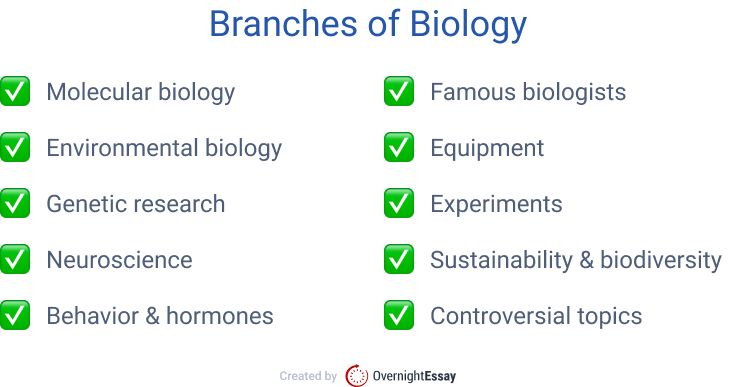
Also, you can choose an interesting biology topic for your research from related topics . You will find 10 interesting biology-related topics in the next section!
What else can you pick for your presentation or research paper? You can focus on the history of biology, current issues, famous biologists, equipment, or biological experiments.
Of course, every biology expert says that their major topic is the most interesting and exciting. However, there are current biology issues that are the most interesting and studied in the world. Here you will find the top 10 interesting biology topics for research .
- Issues and Opportunities for CRISPR and Genetic Engineering
- Epidemiology Studies and Its Opportunities to Combat New Viruses (as Covid-19)
- Infectious -disease-causing agents (Prions) studies
- Climate Change Problems and Potential Solutions
- Cancer Research
- Behavioral Science Studies
- Endangered Species
- Astrobiological Questions
- Synthetic Biology and Its Opportunities
- Epigenetics Studies.
You can also look for an area of biology that you are most interested in and consider the new developments in it – that would make a perfect choice for a biology-related subject . However, it is not your only option. For example, another great topic to consider is biological issues. Ask yourself: what problems are present in the field of biology? Well, here is a small (and not at all exhaustive) list of suggestions.
- Ethics and biology . Consider the protection of human subjects and the alternatives to animal experimentation. Are the other options necessary?
- The attitude to GMOs as a problem. Can public opinion hold science back? Adverse reactions to GMOs should focus on this topic, but you can also consider the effects of the positive ones.Adverse reactions to GMOs should focus on this topic, but you can also consider the effects of the positive ones.
If the topics mentioned above do not attract you, think about other options. For example, choose a branch of biology or a specific aspect of biologists’ activities to discuss! Here are a few suggestions.
- Under the sea! What does a marine biologist do?
- How do you acquire a biological patent? Offer a legal workshop to your peers!
📎 Top 100 Biology Topics for Presentation & Research
We’ve created a list of different biology topics you could choose from for your presentation or research paper. For your convenience, we’ve divided the topics by biological fields. Find your inspiration and get started!
Molecular Biology Research Topics
Molecular Biology is one of the most interesting and prominent fields of biology. Let’s have a look at several relevant topics!
- Origin of Life: The RNA World Scenario Vs. The Latter Scenario . For this topic, you can cover two major theories on how first living cells have occurred. The best idea is to discuss both views and compare them.
- What Are Methods in Molecular Biology Research? Here, you can discuss the basic methods that scientists use in molecular biology studies.
- Molecular Biology of The Cell: An Introduction. This topic implies that you cover the basics of the molecular biology of the cell. As it is a broad theme, the best idea is to focus on the basics.
- Molecular Biology of The Gene: An Overview. We offer you the same strategy as in the previous topic. Just try to cover the basics of the molecular biology of the gene. It can be done by providing key definitions and explaining key theories.
- Molecular Biology of Microorganisms: A brief overview. This topic suits perfectly for a presentation. You can provide a brief overview of the molecular biology of microorganisms. It is a brilliant idea to discuss key terminology, theories, and current issues.
Environmental Biology Research Topics
Environmental topics are among the most popular in biology today. Below you will find 10 topics that you can use for your presentation or research paper.
- How Noise Pollution Influences Living Organisms?
- Environmental Justice: Why It Is Essential?
- Urban Ecology: What Issues It Aims At Solving?
- What Are The Latest Research on Climate Change ?
- Fire Ecology: How Human Beings Can Adapt to Fires?
- Renewable Energy : What Are Potential Risks for Nature?
- Bioremediation: How Microbes Can Eliminate Pollution?
- Limnology Studies: What Are The Main Areas of Research?
- Conservation Biology: What Are The Latest Efforts for Prevention Extinction?
- Satellites and Drones for Studying Natural World Remotely.
Genetics Research Topics
Genetics is an incredibly interesting subject that affects almost any aspect of modern life! We highly recommend you to choose one of the 10 topics that you can find below.
- What Are The Latest Breakthroughs in Genetics Studies?
- Gene Mutation: How It Can Help Fighting Illnesses?
- Genetics Legislation: What Procedures Are Illegal?
- Genetic Tests: How They Can Be Helpful for Fighting Diseases?
- How Genetics Takes Part in Cancer Research?
- What Opportunities Does Genetics Science Open Up for Humanity?
- What Genetic Factors Might Influence Human Behavior ?
- Does Genetics Open Up Opportunities to Choose Sex and Other Characteristics Before Birth?
- Is There a Connection Between Genetics Studies and Environmental Questions?
- Can Extinct Species DNAs Be Recovered?
Neuroscience Research Topics
Here you will find 10 interesting neuroscience research topic for your presentation or research paper:
- How Can Human Emotions Influence Intellectual Abilities?
- How Do Emotions Affect the Perception of Art and Music?
- What Factors Affect the Levels of Dopamine in Human Bodies?
- How Does Alcohol and Marijuana Use Might Influence Teenagers’ Brain Development?
- What Has Neuroscience Achieved Towards Controlling Negativity and Emotional Pain?
- What Are the Controversial Topics in Neuroscience? How It Affects the Discipline?
- Gut Bacteria and Its Influence on Behavior and Mental Health.
- How Humans’ Brains Process Speech?
- How Does Excessive Use of the Internet Affect The Memory?
- What Are The Latest Breakthroughs in Neuroscience?
Behavior and Hormones Research Topics:
Biology Research also focuses on Behavior and Hormones Studies. Here we offer you another 10 interesting topics related to this field.
- How Does Our Hormone System Affect Behavior and Mind?
- What Biological Processes Occur in The Brain while Bipolar Disorder ?
- Depression : What Changes Occur in Hormone System?
- Hormone System and Gender-related Issues
- What Changes Occur in Hormone System While Pregnancy?
- Latest Research on Oxytocin Science: What Is New?
- What Hormones Are Activated While Fear Reaction?
- How Physical Exercises Influence Hormones?
- The Use of Melatonin for Therapeutic Purposes.
- What Hormones Are Responsible for Risky Behavior?
- Cloning and stem cells: Current issues. Is human cloning legal? Why?
- Hybrids as a means to increase efficiency: Mention the animals that are worth making hybrids of.
- The threats and benefits of transgenic crops: Explain that GMO is not that hazardous.
- Fighting inherent diseases: Mention current accomplishments.
- The world under a magnifying glass. Molecular genetics: Define the basic notions.
- The causes of genetic mutations: Provide examples of mutations.
- Research field Biomedicine: Dr. Malcolm E. Miller says…
- Donors and organ transplants: I give you my heart. Pick the problem of finding a proper donor.
- Cosmetic surgery: Is it me, I see? Dwell on the reasons for undergoing cosmetic surgery .
- Behind a brain at work. Neurosurgery problems: Recall leading neurosurgeons and their accomplishments.
- Vascular surgery: It’s in your blood. Mention current achievements.
- Future of prosthetic appliances. Mind-controlled limbs: Include issues from surgery and science engineering.
- Fighting cancer and benign tumors: Never give up. Describe current treatment methods.
- Research field: Ecology and Hippocrates says…
- Saving the Earth: Environment in danger. Convey the idea of balance between the natural and the human-made.
- The means of wildlife preservation: Offer your suggestions to protect wildlife.
- Rare species protection: Enumerate the most endangered species.
- The problem of extinction. The species that are no more: List extinct animals and plants.
- Extreme survival and endangered animals: Offer your suggestions to help animals adapt.
- Invasive species: Only the strong survive. Your idea on the iron jungle issue.
- Sea life: Things people have to know. Offer the least known facts.
- Animal hunting: Following fashion. Mention the animals that suffer the most.
- Environmental pollution: Back to carts? Consider alternative sources of energy.
- Research field: Evolution. Darwin says…
- The law of natural selection: Provide examples of animal evolution.
- Dead branches of evolution: When there’s nowhere to go. Imagine what would have happened if evolution hadn’t stopped.
- Trends in evolution: What is the next step? Find evolution algorithms.
- The reasons for biodiversity loss: Offer your means to sustain current biodiversity.
- Animal and plant habitats: Contamination threat. How to prevent pollution?
- Research field: Biodiversity. Greenpeace says…
- Climate change’s effects on biodiversity: Offer suggestions on how to save various species.
- Coral reefs preservation: Facing challenges. Provide ways to save coral reefs.
- Global warming as a threat for biodiversity. Consider methods of sustainability.
- Econet as a biodiversity conservation tool: Define the Econet system.
Biology Topics: Famous Biologists
You can use the information about biological issues to create a topical, engaging text. However, you have other options, as well. For instance, have you considered writing about famous biologists? Here, we will name just a couple of them.
- Antonie van Leeuwenhoek: when and how did microbiology start? You can add some information on how microbiology has been developing since then.
- Carl Linnaeus. Why do we have binomial nomenclature? Why is it important?
- Edward Jenner: the history of vaccination. Focus on the beginnings of immunization and mention its impact. A brief consideration of the changes in attitudes to it can also be exciting and engaging.
- Rachel Carson . Check out her book, “Silent Spring.” Discuss environmental safety. Why is her contribution significant?
- Stephen Jay Gould. A paleontologist and historian of science: history and biology combined. Consider also his contribution to popular science and pop-science literature.
Biology Topics: Equipment
Come to think of it: every biologist needs tools! Why don’t you choose a piece of biological equipment (e.g., microscope) and discuss the history of its creation and its impact on the development of biology (or a specific branch of biology)? Here are some ideas for insightful equipment-related topics.
- Microscopes: using light and electrons to see this world in detail. Consider telling the brief history of the equipment and explaining its impact. Also, check out the two different types of microscopes.
- Test tubes: spin that sample right round! Who would need a test tube? Why? What for?
- Petri dishes. Culture your sample! Why is it called that way? What is it for? Consider discussing the history and impact of the invention.
- Dyeing your samples: when, why, and how? Tell the history of the development of the technique and the opportunities that it offers.
- How to tell a beaker from a flask? Check out the history of the two types of containers. What is its purpose? Why do they need to be different?
Biology Topics: Experiments
As you can see, your favorite biology field can make a significant research topic. But do you know what can make a biology paper most interesting? Cool bio experiments are out there! Tell your peers how to carry out a bio experiment or, better yet, show them! You can find some of the possible experiment topics below.
- What kind of biological organisms can be found in the samples of water from different sources? Offer examples of sources. If you want a practical demonstration, it is an excellent opportunity to use the microscope so that you can throw in some information about it too.
- How to extract your DNA at home? Discuss the necessary supplies and surprise your audience!
- What happens to an egg dipped in vinegar for too long? Discuss osmosis and its effects.
- If you cannot smell your food, will it taste the same? You can quickly organize a practical demonstration: just provide your audience with small snacks and ask them to cover their noses. Explain the mechanisms of smell and taste.
- How do you make your very own bacteria colony? This topic can be connected to that of the Petri dish.
Biology Topics: Sustainability and Biodiversity
Using a bio experiment as your topic can be great! However, apart from choosing the issues that are most interesting to you, you can find a problem, studying which is a responsible thing to do. For instance, sustainability is not just a buzz word. Discuss sustainability as a part of your bio project or paper and disseminate crucial information about preserving our planet’s resources!
- The concept of sustainability. Consider its history and impact on modern society.
- What biological resources do we need to preserve this day? Make sure to offer both classification and examples!
- Types of pollution. There are more than one, but why bother with the designation? Examples would be great here, too: check out the most devastating events in the history of ecology.
- An exciting element of sustainability is the preservation of biodiversity. Think about extinct species: what have we lost? What can we lose yet? And how do we stop the world from losing its precious biodiversity?
- Why is extinction a problem? Review the consequences of dying out.
- Causes of extinction. Is the human always to blame? Consider non-human matters. Can they be traced back to humanity?
Life science studies all forms of life, including plants, animals, viruses and bacteria, single-celled organisms, and even cells. Its key goal is to examine everything about life on this planet at different stages of evolution.
We have prepared science topics for a presentation to help you and your audience learn more about every living thing on Earth!
Cell Biology Topics for Presentation
Cell biology is the study that seeks to examine the structure and function of cells, their communication, and inner mechanisms.
Here are cell biology topics for a presentation that can come in handy:
- Cell biology: the study of cellular metabolism.
- What are the peculiarities of cell communication?
- The efficiency of cell-based therapy in cancer.
- The role of enzymes in DNA replication.
- Cell death: the key mechanisms.
- Genetic mutation and its influence on human health.
- What is the role of membrane trafficking in plant-microbe interactions?
- The impact of environmental stresses on cells.
- Signal transduction of cells: the main steps and types.
- The ethical issues behind cell therapy.
Human Biology Topics for Presentation
Human biology studies the structure, function, and behavior of the human body. It aims to understand how the human body works and use that knowledge to improve people’s health and well-being.
Below, you can find interesting human biology topics for presentation:
- How does the central nervous system function?
- Artery vs. vein: the key distinctions.
- The peculiarities of the human respiratory system.
- Regular training and its impact on the human heart.
- The differences in the skeletal structure of males and females.
- Lung cancer: causes, symptoms, and consequences.
- The importance and role of genes.
- How do digestive organs interact with one another?
- Practical methods for protecting the immune system.
- Thyroid gland: function, location, and common conditions.
Zoology Topics for Presentation
Zoology is a branch of biology that investigates all animals, both living and extinct. Zoology significantly aids in understanding the natural world and minimizing harm to animal populations and their habitats.
Zoology topics for presentation look the following way:
- The impact of global warming on baby lizards.
- Mesozoic Era: the overview of animal species.
- What are the molecular and genetic bases of animal evolution?
- The cases of the gray wolf return.
- Brain size and its impact on species intelligence.
- The benefits and drawbacks of trout fish hatcheries.
- The ethical considerations in animal research and testing.
- How do animals reproduce and pass on their genes?
- The effect of habitat destruction on the population of local animals.
- The peculiarities of primate language.
Have you not found the perfect topic for your presentation yet? Do not panic! We have some additional easy biology topics that you can use!
- The fundamental biological principles and concepts.
- What is the role of photosynthesis in the carbon cycle?
- The origins of viruses in the evolutionary history of life.
- The problem of obesity in house pets.
- Allergic reactions: symptoms and triggers.
- What are the pros and cons of vaccination?
- The complexity of the immune system.
- The role of camouflage in sea animals.
- Human memory: the basics of work.
- How does alcohol affect the human brain and liver?
- The issue of tropical forests extinction.
- Characteristics of animal behavior in reproduction.
- The impact of pollution on marine life.
- What is the role of biodiversity in ecosystem stability?
- The key functions of the human brain.
❓ 10 Controversial Topics In Biology
There are plenty of controversial and debatable topics on biology. These themes raise questions in terms of their ethical part and sociological perspective . You can prepare an oral presentation or a research paper on one of them. In this section, we’ve prepared for you 10 controversial topics on biology. Get inspired!
- Abortion: When The Basic Legal Right To Live Begin?
- Abortion: Whose Rights Should Be Respected At First?
- Abortion: Are There Any Alternatives (As For Example Adoption)?
- Abortion: Should Be Men Involved in The Decision-Making?
- Human Cloning: What Are The Purposes?
- Human Cloning: Arguments For and Against.
- Human Cloning: An Overview of The Current Situation.
- Animal Experiments: Arguments For and Against.
- Genetically Engineered Food: A Threat or A Solution?
- Embryonic Stem Cells: Arguments For and Against.
And where do you think you are going? Want to create biology topics for project writing? Or develop biology topics for essay papers? Hold on, you still have an important message to read!
State the subject of your research in the paper’s topic!
E.g., Current genetics: Searching for mutations’ causes (the causes of mutations are the obvious subject).
With that in mind, you will surely create perfect topics for biology papers.
We hope that you find our recommendations on interesting biology topics useful and get down to work! Remember, you have plenty of opportunities, from discussing controversial topics to focusing on one of the biological fields we’ve offered. Good luck!
- Ecology, Behavior & Evolution: Research Topics – UC San Diego
- Topic List: Developmental Biology – Stanford Medicine
- Marine Biology: Core Research Areas – University of Washington
- The Biology Undergraduate Major – Stanford University
- What is evolution? | Biological Principles
- Biological Sciences Research Guide – Humboldt State University
- Biochemistry & Molecular Biology – Colorado State University
- Biology Research Projects – University of Nevada
- Biology – Research Basics – University of Texas

- biology research topics
- biology speech topics
- life science
- presentation topics
- school project
- science presentation topics
100+ Interesting Biology Presentation Topics with PPT
- Share to Facebook
- Share to Twitter
Biology Topics for Presentation & Research

Interesting and Easy Biology Presentation Topics
- Biology: Study of life
- The Fundamental Unit of Life
- Career Options with a Biology Degree
- Famous Biologists and Their Contribution
- Biological Discoveries that Revolutionized Life Science
- Biology in Fiction
- Biological Immortality
- The 6 Kingdoms of Life ( PPT 2 )
- Taxonomic Rank
- Animal Cognition : Most Intelligent Non-Human Animals
- Latest Developments and Discoveries in Biology
- The Origin and Evolution of Life on Earth ( PPT 2 )
- The Origins of Life on Earth
- Human evolution
- The Origins of Agriculture
- Disease and Its Types
- Immune System (Complete PPT)
- Major Tropical Diseases ( Article )
- Darwinism: Theory of Biological Evolution ( PPT 2 )
- Domestication of Animals and Plant
- Genetically Modified Organisms ( GMO )
- GMO Crops: Friends or Foe
- Molecular Biology
- Microbiology
- Microbial Genetics
- Biological Molecules
- Gene: Fine Structure of Gene
- Fundamentals of Genetics
- Life Cycle of the Cell
- Classification of Chromosomes
- Gravitational Biology : Gravity and Life on Earth ( Articles )
- The Biology of Wood
- Amazing World of Marine Life
- Bioenergetics and Biochemical Reaction
- Bioluminescence
- Stem and Plant Growth Basics
- Biopolymers and Environmental Impacts
- Impact of Climate Change on Marine Ecosystem
- Ecological Impact of Climate Change
- Bioremediation ( PDF Link )
- Coral Reefs Preservation
- Development and Ageing
- Overpopulation / Overabundance
- Overpopulation: The Causes, Effects And Potential Solutions
- De-extinction: Bringing Extinct Species Back to Life
- Micro-animals
- Aquaculture
- Human Eye: Evolution of the Eye
- Biodiversity and Its Importance
- Importance of Photosynthesis
- Artificial Ecological Systems
- Calvin Cycle
- Phase-Contrast Microscopy
- Central Nervous System
- Reproductive Cloning
- Genetic Mutation in Plants
- Vaccines: How are they Developed?
- Oxygenic photosynthesis: Photosynthesis in Bacteria
- Human Cloning: The origin and its basic principles
- The Origin and Anatomy of COVID-19 Virus
- Mutation of Viruses
- Protein Structure
- Human Microbiome: Gut microbiota
- Pheromones: Are Human Pheromones Real?
- Hydroponics
- Essential Vitamins and Minerals Our Body Needs
- Polymorphism and Colonialism in Honey Bees
- Cellular Structure and Function
- Evolution and Natural Selection
- Major Theories of Evolution
- DNA sequencing and Genetic Code
- Structure, Functions, and Types of Ecosystem
- Food Chains and Food Webs: Concept and Applications
- Conservation Biology: The Latest Efforts for Prevention Extinction
- What makes Tardigrades, the world's toughest animal?
- Different methods of Food Preservation
- The Nitrogen cycle and Nitrogen Fixation
- Hormones and Human Behaviour
- Life Cycle of Your Favorite Plant
- Environmental Sustainability
- Influence of Noise Pollution on Living Organisms
- Fertilizers and Influence on Plants
- Urban Ecology
- Marine Biology: Function, Biodiversity, Ecology
- Natural Disease Resistance in Plants
- Tissue Engineering
- Circadian Rhythm or Circadian Cycle
- Muscle Contraction
- Skeleton System in Human and Animals
- Respiratory System in Animals and Plants
- Urinary system
- Nutrition in Human, Plant, Animals
- Minerals in the plant cell
- Plant Roots, Anatomical Structure, and Functions
- Phytohormones: Plant Hormones
- Glands: Anatomy and Function
- Human Immune System
- Heart and Circulatory System
- Predation, Herbivory, and Parasitism
- Plant Root System
- Decomposers and Scavengers: Importance
- Migration of Organisms
- Animal Navigation Ability
- Animal Reproduction
- Plant Reproduction
- Urinary System of Aquatic Animals
- Plant Diseases: Natural Disease Resistance in Plants
- Antibiotics
- Factors Affecting Enzymatic Activity
- Plant Morphology
- Endangered species
- Ecotourism and Its Benefits
- Modern Technology and Scientific Tools in Biology
- Water cycle / Hydrologic Cycle / Hydrological Cycle
- Homeothermy
- Poikilothermy
- Medicinal Plants Around Us
- The Biology of Seamounts
- Biotechnology Revolution in India
- Noise pollution and the environment
- Nucleotide Biosynthesis
These ideas will fit most standards without creating too much stress if you're seeking simple Biology Presentation Topics for high school assignments and Biology Speech Topics. These interesting and easy topics are listed for anyone who has to deal with Biology for any reason, including school and undergraduate students. It all relies on the scope and magnitude of your project, which is why you may require professional research paper assistance.
Share this Article
Subscribe via email, related post.
- Like on Facebook
- Follow on Twitter
- Follow on Slideshare
- Follow on Pinterest
- Subscribe on Youtube
Trending Seminar Topics
- 100+ Seminar Topics for Youth, Teenagers, College Students Young people are on a never-ending quest for transcendence, which drives them to want to improve the environment, countries, communities,...
- 30+ Technical Seminar Topics for Presentation: Latest Tech Trends Technology is rapidly evolving today, allowing for faster change and progress and accelerating the rate of change. However, it is not just t...
- 100 PowerPoint Presentation Topics in Hindi (Download PPT) विद्यार्थियों के लिए प्रेजेंटेशन का महत्व प्रेजेंटेशन (presentation) देना शैक्षणिक पाठ्यक्रम का एक महत्वपूर्ण व्यावहारिक पाठ्यक्रम है, ...
- 100+ Interesting Biology Presentation Topics with PPT Biology Topics for Presentation & Research Biology is a topic that every school student studies and university student who does major in...
- 100 Interesting Fun Topics for Presentations Fun Topics for Presentations We have prepared for you a fantastic collection of fun topics for presentation with relevant links to the artic...
Recent Seminar Topics
Seminar topics.
- 💻 Seminar Topics for CSE Computer Science Engineering
- ⚙️ Seminar Topics for Mechanical Engineering ME
- 📡 Seminar Topics for ECE Electronics and Communication
- ⚡️ Seminar Topics for Electrical Engineering EEE
- 👷🏻 Seminar Topics for Civil Engineering
- 🏭 Seminar Topics for Production Engineering
- 💡 Physics Seminar Topics
- 🌎 Seminar Topics for Environment
- ⚗️ Chemistry Seminar Topics
- 📈 Business Seminar Topics
- 👦🏻 Seminar Topics for Youth
Investigatory Projects Topics
- 👨🏻🔬 Chemistry Investigatory Projects Topics
- 📧 Contact Us For Seminar Topics
- 👉🏼Follow us in Slideshare
Presentation Topics
- 🌍 Environment Related Presentation Topics
- ⚗️ Inorganic Chemistry Presentation Topics
- 👨🏻🎓 General Presentation Topics
- 🦚 Hindi Presentation Topics
- 🪐 Physics Presentation Topics
- 🧪 Chemistry: Interesting Presentation Topics
- 🌿 Biology Presentation Topics
- 🧬 Organic Chemistry Presentation Topics
Speech Topics and Ideas
- 🦁 Informative and Persuasive Speech Topics on Animals
- 🚗 Informative and Persuasive Speech Topics on Automotives
- 💡 Ideas to Choose Right Informative Speech
- 👩🏻🎓 Informative Speech Topics For College Students
- 🔬 Informative Speech Topics on Science and Technology
- How it works
Published by Robert Bruce at August 29th, 2023 , Revised On September 5, 2023
Biology Research Topics
Are you in need of captivating and achievable research topics within the field of biology? Your quest for the best biology topics ends right here as this article furnishes you with 100 distinctive and original concepts for biology research, laying the groundwork for your research endeavor.
Table of Contents
Our proficient researchers have thoughtfully curated these biology research themes, considering the substantial body of literature accessible and the prevailing gaps in research.
Should none of these topics elicit enthusiasm, our specialists are equally capable of proposing tailor-made research ideas in biology, finely tuned to cater to your requirements.
Thus, without further delay, we present our compilation of biology research topics crafted to accommodate students and researchers.
Research Topics in Marine Biology
- Impact of climate change on coral reef ecosystems.
- Biodiversity and adaptation of deep-sea organisms.
- Effects of pollution on marine life and ecosystems.
- Role of marine protected areas in conserving biodiversity.
- Microplastics in marine environments: sources, impacts, and mitigation.
Biological Anthropology Research Topics
- Evolutionary implications of early human migration patterns.
- Genetic and environmental factors influencing human height variation.
- Cultural evolution and its impact on human societies.
- Paleoanthropological insights into human dietary adaptations.
- Genetic diversity and population history of indigenous communities.
Biological Psychology Research Topics
- Neurobiological basis of addiction and its treatment.
- Impact of stress on brain structure and function.
- Genetic and environmental influences on mental health disorders.
- Neural mechanisms underlying emotions and emotional regulation.
- Role of the gut-brain axis in psychological well-being.
Cancer Biology Research Topics
- Targeted therapies in precision cancer medicine.
- Tumor microenvironment and its influence on cancer progression.
- Epigenetic modifications in cancer development and therapy.
- Immune checkpoint inhibitors and their role in cancer immunotherapy.
- Early detection and diagnosis strategies for various types of cancer.
Also read: Cancer research topics
Cell Biology Research Topics
- Mechanisms of autophagy and its implications in health and disease.
- Intracellular transport and organelle dynamics in cell function.
- Role of cell signaling pathways in cellular response to external stimuli.
- Cell cycle regulation and its relevance to cancer development.
- Cellular mechanisms of apoptosis and programmed cell death.
Developmental Biology Research Topics
- Genetic and molecular basis of limb development in vertebrates.
- Evolution of embryonic development and its impact on morphological diversity.
- Stem cell therapy and regenerative medicine approaches.
- Mechanisms of organogenesis and tissue regeneration in animals.
- Role of non-coding RNAs in developmental processes.
Also read: Education research topics
Human Biology Research Topics
- Genetic factors influencing susceptibility to infectious diseases.
- Human microbiome and its impact on health and disease.
- Genetic basis of rare and common human diseases.
- Genetic and environmental factors contributing to aging.
- Impact of lifestyle and diet on human health and longevity.
Molecular Biology Research Topics
- CRISPR-Cas gene editing technology and its applications.
- Non-coding RNAs as regulators of gene expression.
- Role of epigenetics in gene regulation and disease.
- Mechanisms of DNA repair and genome stability.
- Molecular basis of cellular metabolism and energy production.
Research Topics in Biology for Undergraduates
- 41. Investigating the effects of pollutants on local plant species.
- Microbial diversity and ecosystem functioning in a specific habitat.
- Understanding the genetics of antibiotic resistance in bacteria.
- Impact of urbanization on bird populations and biodiversity.
- Investigating the role of pheromones in insect communication.
Synthetic Biology Research Topics
- Design and construction of synthetic biological circuits.
- Synthetic biology applications in biofuel production.
- Ethical considerations in synthetic biology research and applications.
- Synthetic biology approaches to engineering novel enzymes.
- Creating synthetic organisms with modified functions and capabilities.
Animal Biology Research Topics
- Evolution of mating behaviors in animal species.
- Genetic basis of color variation in butterfly wings.
- Impact of habitat fragmentation on amphibian populations.
- Behavior and communication in social insect colonies.
- Adaptations of marine mammals to aquatic environments.
Also read: Nursing research topics
Best Biology Research Topics
- Unraveling the mysteries of circadian rhythms in organisms.
- Investigating the ecological significance of cryptic coloration.
- Evolution of venomous animals and their prey.
- The role of endosymbiosis in the evolution of eukaryotic cells.
- Exploring the potential of extremophiles in biotechnology.
Biological Psychology Research Paper Topics
- Neurobiological mechanisms underlying memory formation.
- Impact of sleep disorders on cognitive function and mental health.
- Biological basis of personality traits and behavior.
- Neural correlates of emotions and emotional disorders.
- Role of neuroplasticity in brain recovery after injury.
Biological Science Research Topics:
- Role of gut microbiota in immune system development.
- Molecular mechanisms of gene regulation during development.
- Impact of climate change on insect population dynamics.
- Genetic basis of neurodegenerative diseases like Alzheimer’s.
- Evolutionary relationships among vertebrate species based on DNA analysis.
Biology Education Research Topics
- Effectiveness of inquiry-based learning in biology classrooms.
- Assessing the impact of virtual labs on student understanding of biology concepts.
- Gender disparities in science education and strategies for closing the gap.
- Role of outdoor education in enhancing students’ ecological awareness.
- Integrating technology in biology education: challenges and opportunities.
Biology-Related Research Topics
- The intersection of ecology and economics in conservation planning.
- Molecular basis of antibiotic resistance in pathogenic bacteria.
- Implications of genetic modification of crops for food security.
- Evolutionary perspectives on cooperation and altruism in animal behavior.
- Environmental impacts of genetically modified organisms (GMOs).
Biology Research Proposal Topics
- Investigating the role of microRNAs in cancer progression.
- Exploring the effects of pollution on aquatic biodiversity.
- Developing a gene therapy approach for a genetic disorder.
- Assessing the potential of natural compounds as anti-inflammatory agents.
- Studying the molecular basis of cellular senescence and aging.
Biology Research Topic Ideas
- Role of pheromones in insect mate selection and behavior.
- Investigating the molecular basis of neurodevelopmental disorders.
- Impact of climate change on plant-pollinator interactions.
- Genetic diversity and conservation of endangered species.
- Evolutionary patterns in mimicry and camouflage in organisms.
Biology Research Topics for Undergraduates
- Effects of different fertilizers on plant growth and soil health.
- Investigating the biodiversity of a local freshwater ecosystem.
- Evolutionary origins of a specific animal adaptation.
- Genetic diversity and disease susceptibility in human populations.
- Role of specific genes in regulating the immune response.
Cell and Molecular Biology Research Topics
- Molecular mechanisms of DNA replication and repair.
- Role of microRNAs in post-transcriptional gene regulation.
- Investigating the cell cycle and its control mechanisms.
- Molecular basis of mitochondrial diseases and therapies.
- Cellular responses to oxidative stress and their implications in ageing.
These topics cover a broad range of subjects within biology, offering plenty of options for research projects. Remember that you can further refine these topics based on your specific interests and research goals.
Frequently Asked Questions
What are some good research topics in biology?
A good research topic in biology will address a specific problem in any of the several areas of biology, such as marine biology, molecular biology, cellular biology, animal biology, or cancer biology.
A topic that enables you to investigate a problem in any area of biology will help you make a meaningful contribution.
How to choose a research topic in biology?
Choosing a research topic in biology is simple.
Follow the steps:
- Generate potential topics.
- Consider your areas of knowledge and personal passions.
- Conduct a thorough review of existing literature.
- Evaluate the practicality and viability.
- Narrow down and refine your research query.
- Remain receptive to new ideas and suggestions.
Who Are We?
For several years, Research Prospect has been offering students around the globe complimentary research topic suggestions. We aim to assist students in choosing a research topic that is both suitable and feasible for their project, leading to the attainment of their desired grades. Explore how our services, including research proposal writing , dissertation outline creation, and comprehensive thesis writing , can contribute to your college’s success.
You May Also Like
Welcome to the most comprehensive resource page of climate change research topics, a crucial field of study central to understanding […]
How many universities in Canada? Over 100 private universities and 96 public ones, the top ones include U of T, UBC, and Western University.
A preliminary literature review is an initial exploration of existing research on a topic, setting the foundation for in-depth study.
Ready to place an order?
USEFUL LINKS
Learning resources, company details.
- How It Works
Automated page speed optimizations for fast site performance
49 Most Interesting Biology Research Topics
August 21, 2023

In need of the perfect biology research topics—ideas that can both showcase your intellect and fuel your academic success? Lost in the boundless landscape of possible biology topics to research? And afraid you’ll never get a chance to begin writing your paper, let alone finish writing? Whether you’re a budding biologist hoping for a challenge or a novice seeking easy biology research topics to wade into, this blog offers curated and comprehensible options.
And if you’re a high school or transfer student looking for opportunities to immerse yourself in biology, consider learning more about research opportunities for high school students , top summer programs for high school students , best colleges for studying biomedical engineering , and best colleges for studying biology .
What is biology?
Well, biology explores the web of life that envelops our planet, from the teeny-tiny microbes to the big complex ecosystems. Biology investigates the molecular processes that define existence, deciphers the interplay of genes, and examines all the dynamic ways organisms interact with their environments. And through biology, you can gain not only knowledge, but a deeper appreciation for the interconnectedness of all living things. Pretty cool!
There are lots and lots of sub-disciplines within biology, branching out in all directions. Throughout this list, we won’t follow all of those branches, but we will follow many. And while none of these branches are truly simple or easy, some might be easier than others. Now we’ll take a look at a few various biology research topics and example questions that could pique your curiosity.
Climate change and ecosystems
The first of our potentially easy biology research topics: climate change and ecosystems. Investigate how ecosystems respond and adapt to the changing climate. And learn about shifts in species distributions , phenology , and ecological interactions .
1) How are different ecosystems responding to temperature changes and altered precipitation patterns?2) What are the implications of shifts in species distributions for ecosystem stability and functioning?
2) Or how does phenology change in response to climate shifts? And how do those changes impact species interactions?
3) Which underlying genetic and physiological mechanisms enable certain species to adapt to changing climate conditions?
4) And how do changing climate conditions affect species’ abilities to interact and form mutualistic relationships within ecosystems?
Microbiome and human health
Intrigued by the relationship between the gut and the rest of the body? Study the complex microbiome . You could learn how gut microbes influence digestion, immunity, and even mental health.
5) How do specific gut microbial communities impact nutrient absorption?
6) What are the connections between the gut microbiome, immune system development, and susceptibility to autoimmune diseases?
7) What ethical considerations need to be addressed when developing personalized microbiome-based therapies? And how can these therapies be safely and equitably integrated into clinical practice?
8) Or how do variations in the gut microbiome contribute to mental health conditions such as anxiety and depression?
9) How do changes in diet and lifestyle affect the composition and function of the gut microbiome? And what are the subsequent health implications?
Urban biodiversity conservation
Next, here’s another one of the potentially easy biology research topics. Examine the challenges and strategies for conserving biodiversity in urban environments. Consider the impact of urbanization on native species and ecosystem services. Then investigate the decline of pollinators and its implications for food security or ecosystem health.
10) How does urbanization influence the abundance and diversity of native plant and animal species in cities?
11) Or what are effective strategies for creating and maintaining green spaces that support urban biodiversity and ecosystem services?
12) How do different urban design and planning approaches impact the distribution of wildlife species and their interactions?
13) What are the best practices for engaging urban communities in biodiversity conservation efforts?
14) And how can urban agriculture and rooftop gardens contribute to urban biodiversity conservation while also addressing food security challenges?
Bioengineering
Are you a problem solver at heart? Then try approaching the intersection of engineering, biology, and medicine. Delve into the field of synthetic biology , where researchers engineer biological systems to create novel organisms with useful applications.
15) How can synthetic biology be harnessed to develop new, sustainable sources of biofuels from engineered microorganisms?
16) And what ethical considerations arise when creating genetically modified organisms for bioremediation purposes?
17) Can synthetic biology techniques be used to design plants that are more efficient at withdrawing carbon dioxide from the atmosphere?
18) How can bioengineering create organisms capable of producing valuable pharmaceutical compounds in a controlled and sustainable manner?
19) But what are the potential risks and benefits of using engineered organisms for large-scale environmental cleanup projects?
Neurobiology
Interested in learning more about what makes creatures tick? Then this might be one of your favorite biology topics to research. Explore the neural mechanisms that underlie complex behaviors in animals and humans. Shed light on topics like decision-making, social interactions, and addiction. And investigate how brain plasticity and neurogenesis help the brain adapt to learning, injury, and aging.
20) How does the brain’s reward circuitry influence decision-making processes in situations involving risk and reward?
21) What neural mechanisms underlie empathy and social interactions in both humans and animals?
22) Or how do changes in neural plasticity contribute to age-related cognitive decline and neurodegenerative diseases?
23) Can insights from neurobiology inform the development of more effective treatments for addiction and substance abuse?
24) What are the neural correlates of learning and memory? And how can our understanding of these processes be applied to educational strategies?
Plant epigenomics
While this might not be one of the easy biology research topics, it will appeal to plant enthusiasts. Explore how epigenetic modifications in plants affect their ability to respond and adapt to changing environmental conditions.
25) How do epigenetic modifications influence the expression of stress-related genes in plants exposed to temperature fluctuations?
26) Or what role do epigenetic changes play in plants’ abilities to acclimate to changing levels of air pollution?
27) Can certain epigenetic modifications be used as indicators of a plant’s adaptability to new environments?
28) How do epigenetic modifications contribute to the transgenerational inheritance of traits related to stress resistance?
29) And can targeted manipulation of epigenetic marks enhance crop plants’ ability to withstand changing environmental conditions?
Conservation genomics
Motivated to save the planet? Conservation genomics stands at the forefront of modern biology, merging the power of genetics with the urgent need to protect Earth’s biodiversity. Study genetic diversity, population dynamics, and how endangered species adapt in response to environmental changes.
30) How does genetic diversity within endangered species influence their ability to adapt to changing environmental conditions?
31) What genetic factors contribute to the susceptibility of certain populations to diseases, and how can this knowledge inform conservation strategies?
32) How can genomic data be used to inform captive breeding and reintroduction programs for endangered species?
33) And what are the genomic signatures of adaptation in response to human-induced environmental changes, such as habitat fragmentation and pollution?
34) Or how can genomics help identify “hotspots” of biodiversity that are particularly important for conservation efforts?
Zoonotic disease transmission
And here’s one of the biology research topics that’s been on all our minds in recent years. Investigate the factors contributing to the transmission of zoonotic diseases , like COVID-19. Then posit strategies for prevention and early detection.
35) What are the ecological and genetic factors that facilitate the spillover of zoonotic pathogens from animals to humans?
36) Or how do changes in land use, deforestation, and urbanization impact the risk of zoonotic disease emergence?
37) Can early detection and surveillance systems be developed to predict and mitigate the spread of zoonotic diseases?
38) How do social and cultural factors influence human behaviors that contribute to zoonotic disease transmission?
39) And can strategies be implemented to improve global pandemic preparedness?
Bioinformatics
Are you a data fanatic? Bioinformatics involves developing computational tools and techniques to analyze and interpret large biological datasets. This enables advancements in genomics, proteomics, and systems biology. So delve into the world of bioinformatics to learn how large-scale genomic and molecular data are revolutionizing biological research.
40) How can machine learning algorithms predict the function of genes based on their DNA sequences?
41) And what computational methods can identify potential drug targets by analyzing protein-protein interactions in large biological datasets?
42) Can bioinformatics tools be used to identify potential disease-causing mutations in human genomes and guide personalized medicine approaches?
43) What are the challenges and opportunities in analyzing “omics” data (genomics, proteomics, transcriptomics) to uncover novel biological insights?
44) Or how can bioinformatics contribute to our understanding of microbial diversity, evolution, and interactions within ecosystems?
Regenerative medicine
While definitely not one of the easy biology research topics, regenerative medicine will appeal to those interested in healthcare. Research innovative approaches to stimulate tissue and organ regeneration, using stem cells, tissue engineering, and biotechnology. And while you’re at it, discover the next potential medical breakthrough.
45) How can stem cells be directed to differentiate into specific cell types for tissue regeneration, and what factors influence this process?
46) Or what are the potential applications of 3D bioprinting in creating functional tissues and organs for transplantation?
47) How can bioengineered scaffolds enhance tissue regeneration and integration with host tissues?
48) What are the ethical considerations surrounding the use of stem cells and regenerative therapies in medical treatments?
49) And can regenerative medicine approaches be used to treat neurodegenerative disorders and restore brain function?
Biology Research Topics – Final thoughts
So as you take your next steps, try not to feel overwhelmed. And instead, appreciate the vast realm of possibilities that biology research topics offer. Because the array of biology topics to research is as diverse as the ecosystems it seeks to understand. And no matter if you’re only looking for easy biology research topics, or you’re itching to unravel the mysteries of plant-microbe interactions, your exploration will continue to deepen what we know of the world around us.
- High School Success

Mariya holds a BFA in Creative Writing from the Pratt Institute and is currently pursuing an MFA in writing at the University of California Davis. Mariya serves as a teaching assistant in the English department at UC Davis. She previously served as an associate editor at Carve Magazine for two years, where she managed 60 fiction writers. She is the winner of the 2015 Stony Brook Fiction Prize, and her short stories have been published in Mid-American Review , Cutbank , Sonora Review , New Orleans Review , and The Collagist , among other magazines.
- 2-Year Colleges
- Application Strategies
- Best Colleges by Major
- Best Colleges by State
- Big Picture
- Career & Personality Assessment
- College Essay
- College Search/Knowledge
- College Success
- Costs & Financial Aid
- Dental School Admissions
- Extracurricular Activities
- Graduate School Admissions
- High Schools
- Law School Admissions
- Medical School Admissions
- Navigating the Admissions Process
- Online Learning
- Private High School Spotlight
- Summer Program Spotlight
- Summer Programs
- Test Prep Provider Spotlight

“Innovative and invaluable…use this book as your college lifeline.”
— Lynn O'Shaughnessy
Nationally Recognized College Expert
College Planning in Your Inbox
Join our information-packed monthly newsletter.
I am a... Student Student Parent Counselor Educator Other First Name Last Name Email Address Zip Code Area of Interest Business Computer Science Engineering Fine/Performing Arts Humanities Mathematics STEM Pre-Med Psychology Social Studies/Sciences Submit
200+ Unique And Interesting Biology Research Topics For Students In 2023

Are you curious about the fascinating world of biology and its many research possibilities? Well, you are in the right place! In this blog, we will explore biology research topics, exploring what biology is, what constitutes a good research topic, and how to go about selecting the perfect one for your academic journey.
So, what exactly is biology? Biology is the study of living organisms and their interactions with the environment. It includes everything from the tiniest cells to the largest ecosystems, making it a diverse and exciting field of study.
Stay tuned to learn more about biology research topics as we present over 200 intriguing research ideas for students, emphasizing the importance of selecting the right one. In addition, we will also share resources to make your quest for the perfect topic a breeze. Let’s embark on this scientific journey together!
If you are having trouble with any kind of assignment or task, do not worry—we can give you the best microbiology assignment help at a value price. Additionally, you may look at nursing project ideas .
What Is Biology?
Table of Contents
Biology is the study of living things, like animals, plants, and even tiny organisms too small to see. It helps us understand how these living things work and how they interact with each other and their environment. Biologists, or scientists who study biology, explore topics like how animals breathe, how plants grow, and how our bodies function. By learning about biology, we can better care for the Earth and all its living creatures.
What Is A Good Biology Research Topic?
A good biology research topic is a question or problem in the field of biology that scientists want to investigate and learn more about. It should be interesting and important, like studying how a new medicine can treat a disease or how animals adapt to changing environments. The topic should also be specific and clear, so researchers can focus on finding answers. Additionally, it’s helpful if the topic hasn’t been studied extensively before, so the research can contribute new knowledge to the field of biology and help us better understand the natural world.
Tips For Choosing A Biology Research Topics
Here are some tips for choosing a biology research topics:
1. Choose What Interests You
When picking a biology research topic, go for something that you personally find fascinating and enjoyable. When you’re genuinely curious about it, you’ll be more motivated to study and learn.
2. Select a Significant Topic
Look for a subject in biology that has real-world importance. Think about whether your research can address practical issues, like finding cures for diseases or understanding environmental problems. Research that can make a positive impact is usually a good choice.
3. Check If It’s Doable
Consider if you have the necessary tools and time to carry out your research. It’s essential to pick a topic that you can actually study with the resources available to you.
4. Add Your Unique Perspective
Try to find a fresh or different angle for your research. While you can build upon existing knowledge, bringing something new or unique to the table can make your research more exciting and valuable.
5. Seek Guidance
Don’t hesitate to ask for advice from your teachers or experienced researchers. They can provide you with valuable insights and help you make a smart decision when choosing your research topic in biology.
Biology Research Topics For College Students
1. Investigating the role of genetic mutations in cancer development.
2. Analyzing the impact of climate changes on wildlife populations.
3. Studying the ecology of invasive species in urban environments.
4. Investigating the microbiome of the human gut and its relationship to health.
5. Analyzing the genetic diversity of endangered species for conservation.
6. Studying the evolution of antibiotic resistance in bacteria.
7. Investigating the ecological consequences of deforestation.
8. Analyzing the behavior and communication of social insects like ants and bees.
9. Studying the physiology of extreme environments, such as deep-sea hydrothermal vents.
10. Investigating the molecular mechanisms of cell division and mitosis.
Plant Biology Research Topics For College Students
11. Studying the impact of different fertilizers on crop yields and soil health.
12. Analyzing the genetics of plant resistance to pests and diseases.
13. Investigating the role of plant hormones in growth and development.
14. Studying the adaptation of plants to drought conditions.
15. Analyzing the ecological interactions between plants and pollinators.
16. Investigating the use of biotechnology to enhance crop traits.
17. Studying the genetics of plant breeding for improved varieties.
18. Analyzing the physiology of photosynthesis and carbon fixation in plants.
19. Investigating the effects of soil microbiota on plant health.
20. Studying the evolution of plant species in response to changing environments.
Biotechnology Research Topics For College Students
21. Investigating the use of CRISPR-Cas9 technology for genome editing.
22. Analyzing the production of biofuels from microorganisms.
23. Studying the application of biotechnology in medicine, such as gene therapy.
24. Investigating the use of bioplastics as a sustainable alternative to conventional plastics.
25. Analyzing the role of biotechnology in food production, including GMOs.
26. Studying the development of biopharmaceuticals and monoclonal antibodies.
27. Investigating the use of bioremediation to clean up polluted environments.
28. Studying the potential of synthetic biology for creating novel organisms.
29. Analyzing the ethical and social implications of biotechnological advancements.
30. Investigating the use of biotechnology in forensic science, such as DNA analysis.
Molecular Biology Research Topics For Undergraduates
31. Studying the structure and function of DNA and RNA molecules.
32. Analyzing the regulation of gene expression in eukaryotic cells.
33. Investigating the mechanisms of DNA replication and repair.
34. Studying the role of non-coding RNAs in gene regulation.
35. Analyzing the molecular basis of genetic diseases like cystic fibrosis.
36. Investigating the epigenetic modifications that control gene activity.
37. Studying the molecular mechanisms of protein folding and misfolding.
38. Analyzing the molecular pathways involved in cancer progression.
39. Investigating the molecular basis of neurodegenerative diseases.
40. Studying the use of molecular markers in genetic diversity analysis.
Life Science Research Topics For High School Students
41. Investigating the effects of different diets on human health.
42. Analyzing the impact of exercise on cardiovascular fitness.
43. Studying the genetics of inherited traits and diseases.
44. Investigating the ecological interactions in a local ecosystem.
45. Analyzing the diversity of microorganisms in soil or water samples.
46. Studying the anatomy and physiology of a specific organ or system.
47. Investigating the life cycle of a local plant or animal species.
48. Studying the effects of environmental pollutants on aquatic organisms.
49. Analyzing the behavior of a specific animal species in its habitat.
50. Investigating the process of photosynthesis in plants.
Biology Research Topics For Grade 12
51. Investigating the genetic basis of a specific inherited disorder.
52. Analyzing the impact of climate change on a local ecosystem.
53.Studying the biodiversity of a particular rainforest region.
54. Investigating the physiological adaptations of animals to extreme temperatures.
55. Analyzing the effects of pollution on aquatic ecosystems.
56. Studying the life history and conservation status of an endangered species.
57. Investigating the molecular mechanisms of a specific disease.
58. Studying the ecological interactions within a coral reef ecosystem.
59. Analyzing the genetics of plant hybridization and speciation.
60. Investigating the behavior and communication of a particular bird species.
Marine Biology Research Topics
61. Studying the impact of ocean acidification on coral reefs.
62. Analyzing the migration patterns of marine mammals.
63. Investigating the physiology of deep-sea creatures under high pressure.
64. Studying the ecology of phytoplankton and their role in the marine food web.
65. Analyzing the behavior of different species of sharks.
66. Investigating the conservation of sea turtle populations.
67. Studying the biodiversity of deep-sea hydrothermal vent communities.
68. Analyzing the effects of overfishing on marine ecosystems.
69. Investigating the adaptation of marine organisms to extreme cold in polar regions.
70. Studying the bioluminescence and communication in marine organisms.
AP Biology Research Topics
71. Investigating the role of specific enzymes in cellular metabolism.
72. Analyzing the genetic variation within a population.
73. Studying the mechanisms of hormonal regulation in animals.
74. Investigating the principles of Mendelian genetics through trait analysis.
75. Analyzing the ecological succession in a local ecosystem.
76. Studying the physiology of the human circulatory system.
77. Investigating the molecular biology of a specific virus.
78. Studying the principles of natural selection through evolutionary simulations.
79. Analyzing the genetic diversity of a plant species in different habitats.
80. Investigating the effects of different environmental factors on plant growth.
Cell Biology Research Topics
81. Investigating the role of mitochondria in cellular energy production.
82. Analyzing the mechanisms of cell division and mitosis.
83. Studying the function of cell membrane proteins in signal transduction.
84. Investigating the cellular processes involved in apoptosis (cell death).
85. Analyzing the role of endoplasmic reticulum in protein synthesis and folding.
86. Studying the dynamics of the cytoskeleton and cell motility.
87. Investigating the regulation of cell cycle checkpoints.
88. Analyzing the structure and function of cellular organelles.
89. Studying the molecular mechanisms of DNA replication and repair.
90. Investigating the impact of cellular stress on cell health and function.
Human Biology Research Topics
91. Analyzing the genetic basis of inherited diseases in humans.
92. Investigating the physiological responses to exercise and physical activity.
93. Studying the hormonal regulation of the human reproductive system.
94. Analyzing the impact of nutrition on human health and metabolism.
95. Investigating the role of the immune system in disease prevention.
96. Studying the genetics of human evolution and migration.
97. Analyzing the neural mechanisms underlying human cognition and behavior.
98. Investigating the molecular basis of aging and age-related diseases.
99. Studying the impact of environmental toxins on human health.
100. Analyzing the genetics of organ transplantation and tissue compatibility.
Molecular Biology Research Topics
101. Investigating the role of microRNAs in gene regulation.
102. Analyzing the molecular basis of genetic disorders like cystic fibrosis.
103. Studying the epigenetic modifications that control gene expression.
104. Investigating the molecular mechanisms of RNA splicing.
105. Analyzing the role of telomeres in cellular aging.
106. Studying the molecular pathways involved in cancer metastasis.
107. Investigating the molecular basis of neurodegenerative diseases.
108. Studying the molecular interactions in protein-protein networks.
109. Analyzing the molecular mechanisms of DNA damage and repair.
110. Investigating the use of CRISPR-Cas9 for genome editing.
Animal Biology Research Topics
111. Studying the behavior and communication of social insects like ants.
112. Analyzing the physiology of hibernation in mammals.
113. Investigating the ecological interactions in a predator-prey relationship.
114. Studying the adaptations of animals to extreme environments.
115. Analyzing the genetics of inherited traits in animal populations.
116. Investigating the impact of climate change on animal migration patterns.
117. Studying the diversity of marine life in coral reef ecosystems.
118. Analyzing the physiology of flight in birds and bats.
119. Investigating the molecular basis of animal coloration and camouflage.
120. Studying the behavior and conservation of endangered species.
- Neuroscience Research Topics
- Mental Health Research Topics
Plant Biology Research Topics
121. Investigating the role of plant hormones in growth and development.
122. Analyzing the genetics of plant resistance to pests and diseases.
123. Climate change and plant phenology are being examined.
124. Investigating the ecology of mycorrhizal fungi and their symbiosis with plants.
125. Investigating plant photosynthesis and carbon fixing.
126. Molecular analysis of plant stress responses.
127. Investigating the adaptation of plants to drought conditions.
128. Studying the role of plants in phytoremediation of polluted environments.
129. Analyzing the genetics of plant hybridization and speciation.
130. Investigating the molecular basis of plant-microbe interactions.
Environmental Biology Research Topics
131. Analyzing the effects of pollution on aquatic ecosystems.
132. Investigating the biodiversity of a particular ecosystem.
133. Studying the ecological consequences of deforestation.
134. Analyzing the impact of climate change on wildlife populations.
135. Investigating the use of bioremediation to clean up polluted sites.
136. Studying the environmental factors influencing species distribution.
137. Analyzing the effects of habitat fragmentation on wildlife.
138. Investigating the ecology of invasive species in new environments.
139. Studying the conservation of endangered species and habitats.
140. Analyzing the interactions between humans and urban ecosystems.
Chemical Biology Research Topics
141. Investigating the design and synthesis of new drug compounds.
142. Analyzing the molecular mechanisms of enzyme catalysis.
143.Studying the role of small molecules in cellular signaling pathways.
144. Investigating the development of chemical probes for biological research.
145. Studying the chemistry of protein-ligand interactions.
146. Analyzing the use of chemical biology in cancer therapy.
147. Investigating the synthesis of bioactive natural products.
148. Studying the role of chemical compounds in microbial interactions.
149. Analyzing the chemistry of DNA-protein interactions.
150. Investigating the chemical basis of drug resistance in pathogens.
Medical Biology Research Topics
151. Investigating the genetic basis of specific diseases like diabetes.
152. Analyzing the mechanisms of drug resistance in bacteria.
153. Studying the molecular mechanisms of autoimmune diseases.
154. Investigating the development of personalized medicine approaches.
155. Studying the role of inflammation in chronic diseases.
156. Analyzing the genetics of rare diseases and genetic syndromes.
157. Investigating the molecular basis of viral infections and vaccines.
158. Studying the mechanisms of organ transplantation and rejection.
159. Analyzing the molecular diagnostics of cancer.
160. Investigating the biology of stem cells and regenerative medicine.
Evolutionary Biology Research Topics
161. Studying the evolution of human ancestors and early hominids.
162. The genetic variety of species and between species is being looked at.
163. Investigating the role of sexual selection in animal evolution.
164. Studying the co-evolutionary relationships between parasites and hosts.
165. Analyzing the evolutionary adaptations of extremophiles.
166. Investigating the evolution of developmental processes (evo-devo).
167. Studying the biogeography and distribution of species.
168. Analyzing the evolution of mimicry in animals and plants.
169. Investigating the genetics of speciation and hybridization.
170. Studying the evolutionary history of domesticated plants and animals.
Cellular Biology Research Topics
171. Investigating the role of autophagy in cellular homeostasis.
172. Analyzing the mechanisms of cellular transport and trafficking.
173. Studying the regulation of cell adhesion & migration.
174. Investigating the cellular responses to DNA damage.
175. Analyzing the dynamics of cellular membrane structures.
176. Studying the role of cellular organelles in lipid metabolism.
177. Investigating the molecular mechanisms of cell-cell communication.
178. Studying the physiology of cellular respiration and energy production.
179. Analyzing the cellular mechanisms of viral entry and replication.
180. Investigating the role of cellular senescence in aging and disease.
Good Biology Research Topics Related To Brain Injuries
181. Analyzing the molecular mechanisms of traumatic brain injury.
182. Investigating the role of neuroinflammation in brain injury recovery.
183. Studying the impact of concussions on long-term brain health.
184. Analyzing the use of neuroimaging in diagnosing brain injuries.
185. Investigating the development of neuroprotective therapies.
186. Studying the genetics of susceptibility to brain injuries.
187. Analyzing the cognitive and behavioral effects of brain trauma.
188. Investigating the role of rehabilitation in brain injury recovery.
189. Studying the cellular and molecular changes in axonal injury.
190. Looking into how stem cell therapy might be used to help brain injuries.
Biology Quantitative Research Topics
191. Investigating the mathematical modeling of population dynamics.
192. Analyzing the statistical methods for biodiversity assessment.
193. Studying the use of bioinformatics in genomics research.
194. Investigating the quantitative analysis of gene expression data.
195. Studying the mathematical modeling of enzyme kinetics.
196. Analyzing the statistical approaches for epidemiological studies.
197. Investigating the use of computational tools in phylogenetics.
198. Studying the mathematical modeling of ecological systems.
199. Analyzing the quantitative analysis of protein-protein interactions.
200. Investigating the statistical methods for analyzing genetic variation.
Importance Of Choosing The Right Biology Research Topics
Here are some importance of choosing the right biology research topics:
1. Relevance to Your Interests and Goals
Choosing the right biology research topic is important because it should align with your interests and goals. Studying something you’re passionate about keeps you motivated and dedicated to your research.
2. Contribution to Scientific Knowledge
Your research should contribute something valuable to the world of science. Picking the right topic means you have the chance to discover something new or solve a problem, advancing our understanding of the natural world.
3. Availability of Resources
Consider the resources you have or can access. If you pick a topic that demands resources you don’t have, your research may hit a dead end. Choosing wisely means you can work efficiently.
4. Feasibility and Manageability
A good research topic should be manageable within your time frame and capabilities. If it’s too broad or complex, you might get overwhelmed. Picking the right topic ensures your research is doable.
5. Real-World Impact
Think about how your research might benefit the real world. Biology often has implications for health, the environment, or society. Choosing a topic with practical applications can make your work meaningful and potentially change lives.
Resources For Finding Biology Research Topics
There are numerous resources for finding biology research topics:
1. Online Databases
Look on websites like PubMed and Google Scholar. They have lots of biology articles. Type words about what you like to find topics.
2. Academic Journals
Check biology magazines. They talk about new research. You can find ideas and see what’s important.
3. University Websites
Colleges show what their teachers study. Find teachers who like what you like. Ask them about ideas for your own study.
4. Science News and Magazines
Read science news. They tell you about new things in biology. It helps you think of research ideas.
5. Join Biology Forums and Communities
Talk to other people who like biology online. You can ask for ideas and find friends to help you. Use websites like ResearchGate and Reddit for this.
Conclusion
Biology Research Topics offer exciting opportunities for exploration and learning. We’ve explained what biology is and stressed the importance of picking a good research topic. Our tips and extensive list of over 200 biology research topics provide valuable guidance for students.
Selecting the right topic is more than just getting good grades; it’s about making meaningful contributions to our understanding of life. We’ve also shared resources to help you discover even more topics. So, embrace the world of biology research, embark on a journey of discovery, and be part of the ongoing effort to unravel the mysteries of the natural world.
Related Posts

Step by Step Guide on The Best Way to Finance Car

The Best Way on How to Get Fund For Business to Grow it Efficiently
- How It Works
- PhD thesis writing
- Master thesis writing
- Bachelor thesis writing
- Dissertation writing service
- Dissertation abstract writing
- Thesis proposal writing
- Thesis editing service
- Thesis proofreading service
- Thesis formatting service
- Coursework writing service
- Research paper writing service
- Architecture thesis writing
- Computer science thesis writing
- Engineering thesis writing
- History thesis writing
- MBA thesis writing
- Nursing dissertation writing
- Psychology dissertation writing
- Sociology thesis writing
- Statistics dissertation writing
- Buy dissertation online
- Write my dissertation
- Cheap thesis
- Cheap dissertation
- Custom dissertation
- Dissertation help
- Pay for thesis
- Pay for dissertation
- Senior thesis
- Write my thesis
212 Unique Biology Research Topics For Students And Researchers
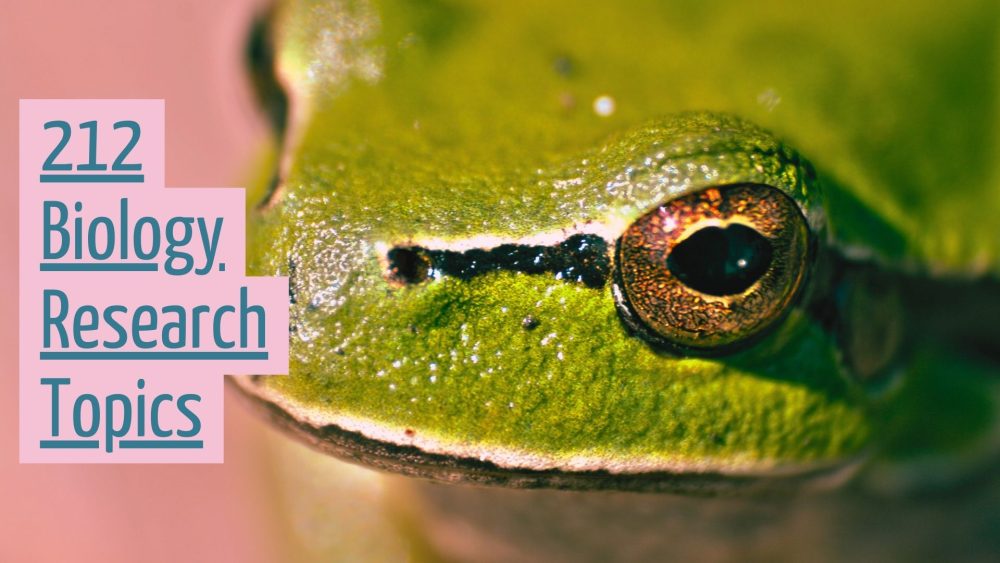
Every student studying something related to biology — botany, marine, animal, medicine, molecular or physical biology, is in an interesting field. It’s a subject that explores how animate and inanimate objects relate to themselves. The field unveils the past, the present, and what lies in the future of the relationship between the living and nonliving things.
This is precisely why you need custom and quality biology topics for your college and university essay or project. It’ll make it easy to brainstorm, research, and get to writing straight away. Before the deep dive, what is biology?
What Is Biology?
Everyone knows it’s the scientific study of life, but beyond that, biology facilitates the comprehension of living and nonliving things. It’s a branch that explores their anatomy, behavior, distribution, morphology, and physiology.
For example, it understands how genes are classified and constituted into generations. It encompasses various branches, including botany, medicine, genetics, ecology, marine biology, zoology, and molecular biology.
Here are what some of these mean:
Botany: This study of plants examines their structure, physiology, ecology, economic importance, and distribution, among others. It also deals with their biochemical processes, properties, and social interactions between plants. It extends to how plants are vital for human life, survival, and growth and how they play a significant role in stabilizing environmental health. Zoology: Zoology studies animal behavior, brain, structure, physiology, class, and distribution. It’s the general study of the lives of both living and extinct animals. It explains animal classification, the animal kingdom, evolution, habitat, embryology, and life span. Physiology: Physiology deals with the daily functions of the human body: How it works and the factors that make it work. It examines molecular behavior, the chemistry and physics behind locomotion, and how the cells in the living organisms’ body function. It helps understand how humans and animals get sick and what can be done to alleviate pain. Microbiology: Dealing with microorganisms, it examined how viruses, algae, fungi, bacteria, protozoa, and slime molds become parts of human life. They’re regarded as microbes, which play substantial roles in the human biochemical processes, including climate change, biodegradation, biodeterioration, food spoilage, biotech, and epidemiology. Marine Biology: This is the scientific study of organs in the sea. It understands their family classification, how they survive, and what makes wild marine animals different from domesticated and consumable ones. It also explores their interaction with the environment through several processes. The marine biologist studies marines in their natural environment, collects data on their characteristics, human impact on their living, and how they relate with themselves.
Now that you know all these, here are some custom biology topics to research for your university or college essay and paper.
Controversial Biology Topics
There are many controversial subjects in every field, and biology isn’t exempt from controversy. If you’d like to create an original essay through diverse opinions, here are biology topics for you:
- What are your thoughts on the post-Roe V Wade world?
- How can the post-Roe V Wade policy affect developing countries looking up to America for their laws?
- Abortion and feminism: discuss
- Does saving life justify cloning?
- Explain the principle of abortion in medical practice
- The effects of cloning in medicine
- How does genetics contribute to obesity?
- Explain why a parent could have Hepatitis B virus and only one of five offspring have the virus
- Is homosexuality really in the gene?
- How does depression correlate with genetics?
- Additives and how they affect the genes
- Examine how genetic mutations work
- Discuss the grounds that you could prove for legalizing human cloning
- Which is more immoral: Human or animal cloning?
- How is nanotechnology different from biotechnology?
- Discuss the manifestation of nanotechnology in science
- Explain three instances where public opinion has held back scientific inventions
- How does transgenic crop work?
- Would you say genetically modified food is safe for consumption?
- Explain why sexual abuse leads to trauma.
Biology Research Paper Topics
You’d need to write an extensive paper on biology one day. This could be when you’re in your final year in college or the university or submitting to a competition. You’d need Biology topics to research for brainstorming, and here are 30 of them:
- Stem cells and tissue formation processes
- Why are there different congenital disabilities?
- Mixtures in anticancer drugs?
- What are the complexities of existing HIV drugs?
- What is the contribution of chemotherapy to cancer?
- Examine the chemotherapy process and why it doesn’t work for some patients.
- Explain the origin of developmental diseases
- How do germs affect the cells?
- What are the consequences of the sun on the white person’s and black person’s skin?
- Why are some diseases treatable through drugs while some are not?
- Scientific lessons learned from COVID-19 and ideas to tackle the next virus
- If animals are carriers of the virus, what should be done to them?
- Examine five animals in extinction and what led to it
- Discuss the subject of endangered species and why people should care
- Is a plant-based diet sustainable for human health?
- Account for the consequence of living on Mars on human health
- Discuss the inconveniences involved in space travel
- How does space flight contribute to environmental disasters
- Discuss the emergence of leukemia
- Explain how the immune systems in humans work
- Evaluate the factors that weaken the immunological system
- What would you consider the deadliest virus?
- Autoimmune: what is it, origin and consequences
- Immune disorder: origin and how it affects the body
- Does stress affect the ability to have sex?
- Contribution of vaccine to eradicating disease: Discuss
- What are the complexities in taking the Hepatitis B vaccine while being positive?
- Allergies: why do humans have them?
- DNA modification: how does it work?
- Explain the misconceptions about the COVID-19 vaccines.
Interesting Biology Topics
Biology doesn’t have to be boring. Different aspects of biology could be fun to explore, especially if you’ve had a flair for the study since your elementary school classes.
You can either write an essay or paper with the following interesting biology research topics:
- Human emotions and conflicts with their intellectual intelligence
- Emotions: Its influence on art and music and how the perception of art influences the world
- The consequences of marijuana and alcohol on teenagers
- Compare and contrast how alcohol affects teenagers and adults
- Discuss the contributions of neuroscience to the subject of emotional pain
- Explain how the brain process speech
- Discuss the factors that cause autism
- Explain what is meant when people say humans are animals
- Why do scientists say humans are pessimists?
- Factors contributing to the dopamine levels human experience
- How does isolation affect the human brain?
- What factors contribute to instinctive responses?
- Noise pollution: how it affects living organisms
- Fire ecology: The contributions of plants to fire outbreak
- Explain the science behind how hot temperature, soil, and dry grass start a fire
- Microbes: what do you understand by bioremediation?
- Explain urban ecology and the challenges it pokes to solve
- Discuss how excessive internet usage affects the human memory
- Evaluate how conservation biology contributes to the extinction prevention efforts
- Discuss the role of satellites and drones in understanding the natural world
- Why do we need space travel and studies?
- Explain the limitations of limnology studies
- What are infectious-disease-causing agents all about?
- Discuss what epigenetics studies encompass
- Why is cancer research essential to the world?
- Discuss climate change: Governments are not interested, and there is no alternative
- How is behavioral science studies a core part of the understanding of the world?
- Discuss the issues with genetic engineering and why it’s a challenge
- Evaluate the strengths and weaknesses in the arguments for a plant-based diet
- Create a survey amongst students of biology asking why they chose to study the course.
Biology Research Topics For College Students
If you find any of the above beyond your intellectual and Research capacity, here are some topics you can handle. You can use these for your essays, projects, quizzes, or competitions.
These custom yet popular biology research topics will examine famous personalities and other discourse in biology:
- Effects of the human hormone on the mind
- Why do men get erect even when they’re absentminded?
- How does women’s arousal work?
- How can melatonin be valuable for therapy?
- Risky behavior: Hormones responsible for the risk
- Stem and cloning: what is the latest research on the subject?
- Hormones: changes in pregnancy
- Why do pregnant women have an appetite for random and remote things?
- The role of physical activities in hormone development
- Examine the benefits and threats of transgenic crops
- The fight against COVID-19: assess current successes
- The fight against smallpox: assess current successes
- The fight against HIV: history, trends, and present research
- Discuss the future of prosthetic appliances
- Examine the research and the future of mind-controlled limbs
- What does cosmetic surgery mean, and why is it needed?
- Analyze the meaning and process of vascular surgery
- Discuss the debate around changes in genital organs for males and females in transgender bodies
- How do donors and organ transplants work?
- Account for the work of Dr. Malcom E Miller
- Discuss the contribution of Charles Darwin to human evolution
- Explain the trends in biomedicine
- Discuss the functions of x-rays in botany
- Assess the most efficient systems for wildlife preservation
- Examine how poverty contributes to climate hazards
- Discuss the process involved in plant metabolism
- The transformation of energy into a living thing: discuss
- Prevention for sexually transmitted disease: What are the misconceptions?
- Analyze how the human body reacts to poison
- Russian Poisoning: What are the lessons scientists must learn?
- COVID-19: Discuss the efforts by two or three governments to prevent the spread
- Discuss the contributions of Pfizer during the pandemic.
Marine Biology Research Topics
This subject explains orgasms in the sea, how they survive, and their interaction with their environment. If you have a flair for this field, the following Biology research topics may interest you:
- Discuss what quantitative ecology through modeling means
- Smallest diatoms and marine logistics: discuss
- How is the shark studied?
- Acidification of seas: Causes and consequences
- Discuss the concept of the immortality of Jellyfishes
- Discuss the differences between seawater and freshwater in marine study
- Account for some of the oldest marine species
- Discuss the evolution of the deep sea
- Explain whales’ communication techniques
- What does plankton ecology encompass?
- The importance of coral reefs to seawater
- Challenges that encompass geological oceanography
- How tourism affects natural animal habitat
- Discuss some instances of the domestication of wild marine animals
- Coastal zone: pros and cons of living in such areas
- How do sharks perceive enemies?
- Analyze why some animals can live in water but can’t live on land
- Explain how plants survive in the sea
- Compare and contrast the different two species of animals in the water
- How can marine energy be generated, stored, and used?
Molecular Biology Research Topics
Focusing on the construct of cells and analysis of their composition, it understands the alteration and maintenance of cellular processes. If you’d like to focus on molecular biology, here are 15 good biology research topics for you:
- Ethical considerations in molecular genetics
- Discuss the structure and component of the gene
- Examine the restrictions in DNA
- What are the peculiarities in modern nucleic acid analysis
- What goes into the Pharmaceutical production of drugs
- Evaluate the building blocks of life
- Discuss the systems of RNA translation to protein
- PCR: How DNA is tested and analyzed
- Why is prion disease so dangerous?
- Compare and contrast recessive genes vs. dominant genes
- Can there be damage to the human DNA, and can it be repaired?
- Constraints in the research of microarray data analysis
- Protein purification: How it evolves
- Objectives of nucleic acid
- Explain the structure of a prion.
Biology Research Topics For High School
Your teachers and professors will be awed if you create impeccable essays for your next report. You need to secure the best grades as you move closer to graduation, and brainstorming any of these popular biology research topics will help:
- Identify the most endangered species
- The challenges to animal extinction
- What are the things everyone should know about sea life?
- Discuss the history of genetics
- Explain the biological theory of Charles Darwin
- How did the lockdown affect social interaction?
- Why do some people refuse the vaccine?
- Origin of genetics
- What is animal hunting, and why is it fashionable
- Explain the evolution of a virus
- Role of lockdown in preventing deaths and illnesses
- Invasive species: What does it mean?
- Endangered animals: How do they survive in the face of their hazards?
- Lockdown and their role in reducing coronavirus transmission
- Vaccine distribution: Ideas for global distribution
- Why can viruses become less virulent?
- Discuss the evolution of the world
- Explain the evolution of the planet
- Explain what Elon Musk means when he says life on Mars is possible
- What does herd immunity mean?
- Flu: why is there a low incidence in 2020?
- Relationship between archaeology and biology
- Antiviral drug: What it means
- Factors leading to the evolution of humans
- Give instances of what natural selection means
- What is considered the dead branches of evolution
- Whale hunting: What it means and the present trends
- Who is Stephen Jay, and what is his role in paleontology?
- Origin of diseases: why must humans fall sick?
- Why are humans called higher animals?
Human Biology Research Topics
Human biology understands humans and their relationship between themselves and their environment. It also studies how the body works and the impediments to health. Here are some easy biology research topics to explore on the subject:
- How do gut bacteria affect the brain?
- What are the ethical concerns around organ transplants?
- The consequence of alcohol on the liver
- The consequences of extreme salt on the human body
- Why do humans need to deworm regularly?
- The relationship between obesity and genetics
- Genetically modified foods: Why are they needed?
- How sun exposure affects human skin
- Latest trends: Depression is hereditary
- Influence of music on the human brain
- What are the stages of lung cancer
- Forensic DNA: latest trends
- How visual consumptions affect how humans think
- What is the process that leads to pregnancy?
- Explain the role of nanotechnology in HIV research
- Discuss any experiment with stem cells you know about
- Explain how humans consume food
- Discuss the process of metabolism as well as its criticality to human health
- Explore the consistent challenges technology poses to human health
- Explain the process of body decay to a skeleton.
Cell Biology Research Topics
There are many evolutionary biology research paper topics formed not by the nomenclature but for what they stand for. Cell biology is one of the most complex branches of the field.
It examines minor units and the living organisms that make them up. The focus is on the relationship between the cytoplasm, membrane, and parts of the cell. Here are some topics to explore for your scientific dissertation writing :
- How does chromatin engage in the alterations of gene expression?
- What are the usual cell infections, and why does the body have immunity defections?
- Identify and account for the heritage of Robert Brown in his core career focus
- Explain the structure of the animal cell and why It’s what it is
- Identify the cells in the human body as well as their functions
- Explain a scenario and justify the context of animals photosynthesizing like plants
- Why do bacteria invade the body, and how do they do it?
- Why are mitochondria considered the powerhouse of the cell
- Use the molecular analysis tool to explain multicellular organisms
- Examine how the White blood cells fight disease
- What do you understand about the role of cell biology in the treatment of Alzheimer’s Disease
- What are the latest research methods in cell biology?
- Identify the characteristics of viruses and why they threaten human existence.
- Discuss the differences between DNA and RNA
- What part of the body is responsible for human functionality for as long as the individual wants?
Get Biology Research Help As Soon As Possible
Creating the best essays or papers is easier now that you have custom biology research topics. However, you may still need support writing your paper beyond these topic ideas. After all, the first stage of writing like experts is brainstorming ideas and researching which is most feasible to write about.
If you truly want to wow your professor or teacher but can’t afford to dedicate all the required time, here’s an alternative. You can hire writing helpers online for quality papers at a cheap price, and we can help with that. We are a team of writers with many years of writing experience for students in Europe and North America. You can even buy thesis online with us, as well as editing services.
Each paper is assigned to writers with expertise in a specific field. This enables them to provide in-depth analysis as your assignment requires. We’re based online, which means you won’t have issues with accessibility and availability. Just tell us what you need, and we will get it done.

Leave a Reply Cancel reply
Your email address will not be published. Required fields are marked *
Comment * Error message
Name * Error message
Email * Error message
Save my name, email, and website in this browser for the next time I comment.
As Putin continues killing civilians, bombing kindergartens, and threatening WWIII, Ukraine fights for the world's peaceful future.
Ukraine Live Updates
404 Not found
Take College Quiz
www.bestcolleges.com is an advertising-supported site. Featured or trusted partner programs and all school search, finder, or match results are for schools that compensate us. This compensation does not influence our school rankings, resource guides, or other editorially-independent information published on this site.
The 10 Most Interesting Biology Research Topics

Turn Your Dreams Into Reality
Take our quiz and we'll do the homework for you! Compare your school matches and apply to your top choice today.
If you ask any biology expert whether their research subject is interesting, of course they'll say yes. Even moss can be fascinating when you look at it under a magnifying glass. Some biology topics are easier for non-biologists to get more excited about than others, though.
Whether you're looking for a research topic for a college paper or an area to specialize in if you're majoring in biology , here are some of the most interesting things going on in the biology world right now.
1. CRISPR and Genetic Engineering
Normally, we think of our DNA as being set in stone. But what if it isn't? What if you could literally change your DNA?
Scientists have only recently figured out how to use CRISPR to edit DNA sequences.
That's what CRISPR promises. Short for Clustered Regularly Interspaced Short Palindromic Repeat, CRISPR is essentially a search and cut/paste function all rolled into one, but for DNA. This organizational pattern appears naturally in bacteria, and scientists have only recently figured out how to use it to edit DNA sequences in other organisms — including humans.
CRISPR is taking off in a big way due to its staggering potential. Imagine if you could cure genetic diseases, change your eye color, or make people permanently resistant to tricky viruses like HIV. It's easy to see the potential for life-changing benefits and great harm at the same time, and that's why there's currently so much excitement about CRISPR.
2. Epidemiology and Coronavirus
Epidemiology is the study of how diseases spread in populations. Now that we're in one of the largest pandemics in recent memory , it's easy to see why this is such an interesting topic. Finding a vaccine and ways to prevent the spread of COVID-19 has become the single greatest all-hands-on-deck effort of our time.
Even before the coronavirus outbreak, epidemiology intrigued scientists. Epidemiologists are often thought of as a modern-day Indiana Jones because they work in remote jungles and chase dangerous and terrifying diseases like Ebola all around the world.
If you haven't heard of prions, make sure you're sitting down. These infectious-disease-causing agents are responsible for things like mad cow disease, chronic wasting disease, and (possibly) Alzheimer's disease .
They work by essentially turning brains into Swiss cheese. Prions aren't fully living organisms like bacteria or parasites; rather, they're bits of misshapen proteins that cause other proteins to become deformed in a chain reaction until the brain is literally full of holes.
Because prions aren't truly alive, there's no real way to "kill" them. As a result, they can persist in the environment and stay contagious for years, even surviving normal sterilization techniques at hospitals and labs. Scientists are trying to understand how prions work on a basic level, and how to prevent them from accumulating in the environment and causing disease.
4. Climate Change
Despite what some governments might think, climate change has emerged as one of the most pressing issues of our time. Scientists have measured the chemical signal from greenhouse gases and determined that it's a direct result of human industrial activity .
Climate change is one of the most pressing issues of our time.
The battle against climate change seems daunting. First, scientists must convince the general public — especially legislators — that the phenomenon exists. Then, there's the huge task of identifying possible solutions.
With global consequences, climate change scientist is a job that's not likely to end within our lifetimes, meaning there's plenty of room for new environmental specialists.
5. Cancer Biology
About 2 out of every 5 people in the U.S. will develop cancer in their lifetimes, according to the National Cancer Institute .
What scientists are learning now is that "cancer" is more of an umbrella term for many different diseases that all have the same outcome: uncontrolled cell growth and, eventually, death. It's not as simple as finding the solution to one disease because cancer is actually many diseases, each with its own cause, progression, outcome, and treatment.
Now that scientists know more about cancer, the path forward is clear: More research on each type of cancer is needed before we can understand and ultimately eradicate it.
6. Behavioral Economics
You know you should pay off your debt and save more money , but most of us don't do that. Why not? And what are scientifically backed ways that we can learn how to do these things?
Behavioral economics is about how your biology affects both your finances and happiness.
This is what the captivating new field of behavioral economics aims to answer. The multidisciplinary approach combines two vastly different areas — economics and behavior — in an effort to understand how humans can live happier lives.
One major paper on the topic linked peak happiness levels to an income of around $75,000. Yet in 2018, the median household income fell short of that mark by almost $15,000 . In other words, behavioral economics is the study of how your biology affects your finances and happiness.
7. Endangered Species Recovery
It's estimated that up to 8,700 species go extinct every year. At this rate, we're due for the biggest mass extinction since the time of the dinosaurs.
And it's not just pandas, caribou, and other cuddly things that are dying out — many of the smaller organisms that keep the ecosystem running smoothly are disappearing, as are "ugly" animals that are still very important to the environment.
Even though the public is generally supportive of recovery efforts, the government conservationists responsible for this work almost always face budget shortfalls. If you're willing to deal with the challenges of working as a wildlife biologist , it can be a highly rewarding career.
8. Astrobiology
We haven't discovered life outside of Earth — yet. Astronomers have crunched the numbers and found overwhelming support for the idea that somewhere out in the cosmos, there's a good chance life exists. Astrobiologists study what those life forms might look like, such as how they reproduce and survive.
Even before we find extraterrestrial life, though, there's plenty of work for astrobiologists to do now with preparing current Earth-dwellers for when we'll eventually jet off this planet. Astrobiologists study things like how gravity affects astronauts' bones, how plants grow in space, and what happens to circadian rhythms on planets with a different day/night cycle.
9. Synthetic Biology
Evolution hasn't created the perfect version of everything yet, but it's come pretty close in a lot of areas. There are lessons we can learn about all kinds of things from the natural world, such as how to design the quietest aircraft by studying owl feathers .
Other synthetic biologists focus on how to redesign organisms to perform useful tasks. For example, you could specialize in engineering microorganisms to produce medical-grade insulin or help with bioremediation efforts in polluted areas.
10. Epigenetics
What if I told you that the stresses your grandparents endured, such as famines, wars, and inequality, could still be affecting you today through your genes ? It's not such a far-fetched idea when you consider the field of epigenetics.
Epigenetics is the study of how genes are inherited and whether they're active or inactive.
Epigenetics is the study of how genes are inherited in either a switched-on or switched-off state. Even though you inherit certain genes from your ancestors, some might not actually be "turned on" despite being present in your DNA. Just like a light switch, genes that have been "turned off" are technically inactive.
Epigenetics is a relatively new field of biology that adds a whole new layer of complexity to the already exciting realm of genetic research.

Andrew Brookes/Getty Images
Never Stop Learning
These 10 biology topics are some of the hottest areas in scientific research today, but don't limit yourself — there's more than enough knowledge to satisfy a curious mind in any field. You might just have to look a little closer under the microscope to find an entirely new world.
Feature Image: sanjeri / Getty Images
Explore More College Resources
Top 10 environmental science research topics.

Should You Major in Biology?
BestColleges.com is an advertising-supported site. Featured or trusted partner programs and all school search, finder, or match results are for schools that compensate us. This compensation does not influence our school rankings, resource guides, or other editorially-independent information published on this site.
Compare Your School Options
View the most relevant schools for your interests and compare them by tuition, programs, acceptance rate, and other factors important to finding your college home.

10 Best Biology Research Papers and Presentation Topic Ideas
Reviewed by Linda Weems I got started researching colleges and universities about 10 years ago while exploring a second career. While my second career ended up being exactly what I’m doing now, and I didn’t end up going to college, I try to put myself in your shoes every step of the way as I build out College Cliffs as a user-friendly resource for prospective students.
Updated: March 9, 2024 , Reading time: 14 minutes
Share this on:
Find your perfect college degree
In this article, we will be covering...
Like most scientific studies, writing biology research papers and presentations is one of the challenging tasks for undergraduates and graduates.
Even high school students find it complicated to write a good biology paper. The main reason is that writing a biology research paper or presentation requires in-depth study and involves significant time and resources.
While most students strive to write a perfect biology paper, many often disregard the importance of finding the appropriate biology research paper topics first.
Narrowing down the best biology research paper and presentation topic ideas is essential since it makes your research paper high-quality and helps you save time and effort.
After all, choosing a biology topic that doesn’t spark interest will only de-motivate students quickly in the long run.

Choosing the Best Biology Topic for Research Papers and Presentations
Students should take their time and think thoroughly when choosing their preferred biology topics. Apart from motivating students, it is crucial to find an interesting biology topic since it forces them to develop their writing, analytical, and research capabilities.
Choosing a boring biology topic or a topic often used by many biology students can be challenging to come up with an outstanding research paper.
Here are some tips on how to find the best topic for your Biology research:
- Read thoroughly the requirements needed for a biology research paper.
- Brainstorm keywords, ideas, and breakthroughs in the field. This way, students can narrow down the topics they’re interested in.
- During lectures and activities, take down notes on the subjects being discussed. Since students gain an overview from their instructors, it’ll become easier for them to focus on one of the topics.
- Formulate a biology research question and develop it into a comprehensive research topic. From there, students can find an effective stepping stone for their research paper, which makes research paper writing easier.
- Browse through notes from discussions and presentations to refresh memory, allowing students to find a compelling topic for their research paper.
- Choose a biology topic from the thesis statement. Since thesis statements discuss an issue that requires solutions, they are excellent for creating a valuable research paper.
Whether you’re finding a topic for a research paper or a presentation, here are ten interesting biology research topics to write about.
Best Biology Research Topics
Neurobiology.

Do you find it fascinating how the human brain works? Neurobiology research topics are some of the most preferred in Biology. It is a biological field that studies tissues and cells that make up the nervous system.
Unlike neuroscience, neurobiology explores the different biological components of human perception, memory, and thought. It is an interdisciplinary study involving a deeper understanding of biology and the nervous system.
Since neurobiology highlights the physiology of the nervous system, biology students pursuing this topic discover more about the physical components of the nervous system and its interactions with the biological systems.
Given that it is an interdisciplinary field, students will also discover the vital role of neurobiology in psychology, especially in psychotherapy. If you also love psychology, pursuing this topic is an excellent option.
Apart from diseases related to the nervous system, students will also have an in-depth understanding of the role of biology in a person’s mental health.
Sample Neurobiology Topics:
- Brain Injuries and Related Diseases
- Factors and Causes Behind Brain Cancer
- Brain Structures: Male Brain vs. Female Brain
Genetic Biology

Do studying genes, cell cycles, and genomes pique your interest? Writing genetic research biology topics is one of the most interesting options to consider.
This biology topic helps students understand the inheritance of traits from parents to their children, handed down from one generation to another. If you often wonder why some parents have offspring who don’t look like them, a Genetic Biology research paper is ideal for you.
Dealing with topics related to chromosomes is also dominant in this field of biology. Hinged on molecular biology research, Genetic Biology also deals with the comprehensive study of human DNA.
The distribution, variation, and structure of genes are researched within the context of population, organism, and cellular levels.
Understanding genetic factors will help students answer some of the most interesting questions about hereditary diseases. Given that, they’ll discover the genetic characteristics of why some disorders are passed down from one generation to the other.
If you want to venture into Genetic Engineering and its benefits in curing genetic diseases, pursuing this research topic makes it easy for students to succeed in their biology studies.
Sample Genetic Biology Topics:
- Development and History of Genetics
- Epigenetics
- Human DNA Structure and History of Diseases
Microbiology

From food science and agriculture to the pharmaceutical industry to nursing, Microbiology is one of the most diverse fields of biology. It is the best biology research topic to pursue if you love anything that can only be seen through a microscope.
Biology students pursuing microbiology research topics study a diverse range of microorganisms, including viruses, archaea, microscopic algae, and bacteria. The application of microbiology in almost all aspects of life makes it easier for students to have an innate passion for writing about this topic.
The study of microbiology helps students understand the genetics, reproduction, physiology, and structure of microorganisms. In healthcare, biology students learn more about mycology, parasitology, and virology.
One of the breakthroughs in microbiology in medical science is fluorescent fusion, a vital process in the rapid detection of pathogens in tissue samples.
The food industry also benefits from students pursuing microbiology, where their expertise is highly needed in the different ways of making food safe and preventing food spoilage.
With pandemics and emerging diseases becoming more rampant, microbiologists can have breakthrough research on finding cures, medications, and other preventive measures for certain diseases.
Sample Microbiology Topics:
- DNA vs. RNA: Comparison and Differences
- Traditional vs. mRNA Vaccines
- Structures of DNA and RNA
Evolutionary Biology

If you want to explore the histories of different life forms, Evolutionary Biology is the best biology research topic. The study highlights the concepts and theories of how microorganisms and life evolve, the reasons for evolvement, and other related factors. Since evolution is an important aspect of life, delving into topics related to evolutionary biology can benefit us in several ways.
Through Evolutionary Biology, students find proof that all living organisms on the planet have a common origin and assess the biological evolution of individual organisms to populations over different generations. Apart from that, they also understand the various misconceptions about evolution.
One of the most notable discoveries in this field is Charles Darwin’s concept of natural selection. Students research the role of reproduction and survival as some of the crucial aspects of evolution. Like genetics and molecular biology, Evolutionary Biology also involves genes and DNA as part of the study.
Mutation, for instance, occurs when heritable cells of living organisms make a wrong replication of DNAs. Biology students will delve deeper into these topics and make their stand.
Sample Evolutionary Biology Topics:
- Charles Darwin’s Theory of Evolution and its Relevance Today
- Human Awareness and Diversity of Life
- Ecological Factors in the Emergence of Infectious Diseases
Ecology-Concerning Biology

Nowadays, extreme weather and climate change have become more relevant than ever. Ecology-concerning Biology is one of the most crucial scientific ventures as the environment deals with human behavior results.
As a result, new findings can contribute to creating a safer and greener natural world. This field can also be used as a predecessor to medical school.
Pursuing ecology-concerning or conservation biology topics, or often environmental biology research topics as a whole, is a stepping stone in a career dedicated to addressing and understanding different threats to the environment.
Both conservation biologists and students discover how humans affect the planet’s biodiversity and ways to prevent species extinction.
Given the environmental diversity, the branch of Ecology offers several sub-topics, including Landscape Ecology , Ecosystem Ecology , Population Ecology , and Community Ecology .
As wildlife or nature advocates, students wanting to become wildlife and ocean conservationists, climate change analysts, hydrogeologists, and environmental protection specialists can benefit from pursuing Ecology-concerning Biology or Conservation Biology topics.
Sample Ecology-concerning Biology Topics:
- Global Warming and Biodiversity
- Advantages and Disadvantages of Ecotourism
- Benefits of Organic Farming
Animal Biology

Do you love studying biology and have a passion for animals? Animal Biology is undoubtedly one of the most interesting biology topics! It is a biological field focusing on the environments, behaviors, and origins of non-plant living organisms. Apart from that, students explore the physical and chemical composition of animals.
Although the field primarily focuses on biology, it specializes in other areas that make interesting topics as well, including animal behavior, veterinary medicine, zoology, animal cellular, and molecular biology research topics,
Pursuing research topics in Animal Biology will help students become more knowledgeable in animal genetics, physiology, molecular biology, and animal evolution. They also learn the different principles of biology that are essential in resolving issues involving domestic, wild, urban, and farm animals.
Some relevant topics include animal nutrition and genetics, livestock management, and farm animal protection. As students explore different learning resources, they identify the crucial roles of animals in the cultural, societal, and economic aspects.
While many career opportunities exist, most professional settings in the field of Animal Biology involve working in a laboratory, working hands-on with animals, researching and teaching, or a hybrid of these options.
Sample Animal Biology Topics:
- Adaptation, Migration, and Hibernation of Animals during Winter
- Animal Behavior due to Climate Change
- Factors and Causes of Animal Extinction
Cell Biology

As its name implies, Cell Biology deals with the smallest living organisms and cellular units of all living things. It is one of the most complex biology research topics, examining the relationship between cellular parts, membranes, and cytoplasm.
From a molecular and microscopic perspective, cell biology studies the interactions, life cycles, and structures of cells. Given the dynamics of cells, it is one of the most progressive areas in the biological field.
Cell Biology doesn’t only involve the overall composition and essence of cells. Students pursuing this topic also discover the different types of cells by function and organism, the biological activity of cells, and other complex cell biology concepts.
Writing about Cell Biology provides students with a detailed understanding of organisms, organ systems, organs, and tissues involving cell composition. It is a diverse topic that can be interconnected with other specializations, including immunology, microbiology, genetics, and molecular biology.
Thanks to progressive and thorough research in the field, many advancements and breakthroughs have been discovered to improve ways to diagnose, treat, and cure various autoimmune diseases.
Sample Cell Biology Topics:
- Stem Cell Research or Stem Cells for Therapy and Cancer
- Dormant Viruses and How They Reactivate
- Cell Tissue Engineering
Human Behavior and Hormones Biology

Like neurobiology, pursuing Human Behavior and Hormones Biology is a fascinating research topic to write about, dealing with the complexities and diversities of the human mind.
As biology majors, students discover how evolution significantly affects the human brain. The topics explain how the brain is influenced by early experiences, controlled by hormones, freed and constrained by genes, and developed through time.
These topics also help students understand genetic abnormalities and how they can be passed down from generation to generation.
Through an in-depth study of biology and human behavior, students examine how a single neuron operates and how millions of neurons work in a specific brain area. Depending on the specialization, some students focus more on the comprehensive study of the brain and its regions involving specific behavior and emotions.
This field of biology also discusses genes and how they influence behaviors from specific genders. Students identify how genes facilitate a series of reactions to their current environment.
The study can interconnect with the field of psychology, discovering advanced treatments for some of the most common psychological disorders.
Sample Human Behavior and Hormones Biology Topics:
- Behavioral Economics
- Differences and Similarities between Male and Female Hormones
- The Biology Behind Mental Health and Psychological Disorders
Immune System Biology (Immunology)

With several infectious diseases emerging, any breakthrough in Immune System Biology is highly desired. As part of students’ research works and presentations, writing about this biology topic helps them identify several factors affecting the immune system.
They learn how the immune system protects the body from pathogens, including toxins, fungi, viruses, and bacteria. Like cell biology, Immune System Biology explores the different proteins, cells, and organs that help the body fight against autoimmune diseases and other disorders.
Biology majors in this field understand the fundamentals of immunology and certain diseases. The topic discusses how certain diseases manifest due to weakened immune systems.
Students also learn how immunodeficiency conditions increase the risk of cancers and infections caused by gene mutation, malnutrition, and viruses like SARS-COV-1 and HIV.
Thanks to the field of immunology, several disciplines have benefitted, especially with diagnoses and treatment plans to cure certain physical and mental disorders. The field has interconnections with several disciplines, including dermatology, psychology, virology, and oncology.
Sample Immune System Biology Research Topics:
- Effects of Stress on the Human Immune System
- Vaccination and Its Long-Term Effects on the Immune System
- Weakened Immune Systems and Related Disorders
Molecular Biology

A list of the best biology research topics wouldn’t be complete without molecular biology on it. The study highlights the complex interactions, structures, and compositions of cells in the body.
Unlike cell biology, Molecular Biology is a specialized branch of biochemistry and biology that deals with maintenance, replication, modification, and mutation at the molecular level.
Pursuing this topic for presentations and research papers helps students understand the different lipids, carbohydrates, proteins, DNAs and RNAs, and nucleic and amino acids in the human body. It establishes a concrete foundation on the importance of macromolecular functions, including DNA mutations, transcriptions, and cell division.
One of the most notable topics covered under Molecular Biology is nucleic acids, such as protein synthesis, RNAs, and DNAs. With climate change and pandemics, viruses that have been dormant for years can reactivate.
To discover state-of-the-art treatments and solutions to address health and environmental issues, Molecular Biology motivates students to have breakthroughs in the field.
Sample Molecular Biology Topics:
- Gene Mutations
- Human Cloning and its Advantages and Disadvantages
- Molecular Genetics
Parts of a Biology Research Paper
Choosing a biology research paper topic is equally important as the writing process. While there are different research paper formats available, the outline ultimately depends on the research requirements set by the school or academic program in which students are currently enrolled.
Ask your instructor to confirm the required formatting style and adhere to it until the end of your research work. Students can also visit their school’s website, seek guidance in their writing center, or get ideas by hiring writers from a writing service organization.
As an overview, most biology research papers have the following outline:
- Introduction
- Body of the research
- Additional Information
There are NO Easy Biology Research Topics!
Biology is one of the most diverse fields in the world of sciences, with various branches and sub-branches. Given the variety of good biology research topics, it is a minefield out there for students looking to ace their papers by featuring the most interesting and fitting topics on biological processes.
This article highlights some of the best biology topics for high school and college students and post-graduate majors.
Apart from these topics, the importance of choosing a biology topic and its standard research paper outline were also discussed to bring students confidence and enthusiasm to create a good biology research paper.
Related Resources:
- Top Survival Tips for Graduate Students
- The Best Online Degrees for Career Advancement
- All About the Modern College Student
Related Posts

Explore ratings and reviews for schools and universities on our platform, your essential guide for making informed educational decisions. Find all the help and information you need for your educational journey in one convenient place.
New User? Start here.
100+ Fascinating Biology Presentation Topics for Students in 2024
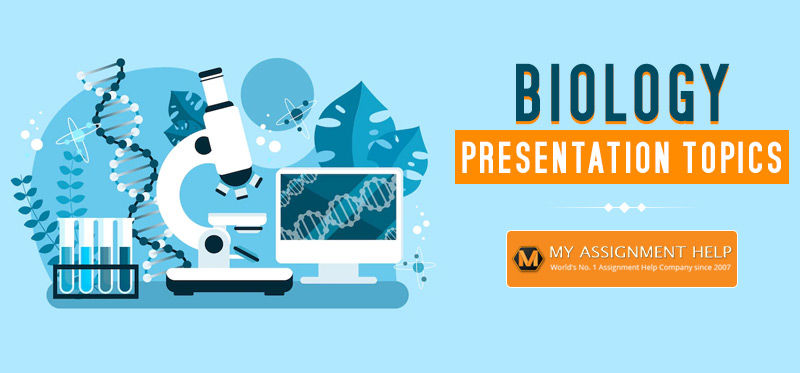
Table of Contents
Biology is an intriguing subject because of the complexity of living organisms. Prepare compelling presentations that emphasize the finest fascinating biology issues to encourage students to devote identities to attract interest for the subject. Thereby, while creating a Biology presentation, you may emphasize intrinsic interest and encourage people to learn and gain more about the study of living organisms.
- Classification of Meristematic and permanent Tissue.
- Conduction of food and water in plants.
- Anatomy and Morphophological study of Flowering plants.
- The transition of Root and Stem.
- Structural analysis of Vascular tissues in plants.
Microbiology:
- Cell culture techniques.
- Types of staining methods and their uses.
- Difference between the cell membrane composition analysis of the types of Bactria and their industrial importance.
- Importance of microorganisms in the pharmaceutical industry.
- Production of Acetic Acid and the role of microorganisms involved.
- Importance of in-situ and ex-situ conservation and protection of extinct animals.
- Parasitises and their adaptation and interdependence with plants and animals.
- Digestion and Assimilation in ruminants.
- Evolution of Five Kingdoms and its importance.
- Flora and Fauna of a Mangrove Forest.
Biochemistry:
- Gluconeogenesis.
- Lipid profile and its mechanism.
- Importance of the TCA cycle in humans.
- Enzyme regulation and metabolism.
- Structure of Amino acids and nucleotides.
Molecular Biology:
- Evolution and interdependence of life with RNA molecules.
- Genomics and Proteomics.
- Gene therapy and its uses.
- Functional genomics: a forensic perspective of biology.
- DNA sequencing and Molecular Hybridization.
Cell Biology:
- Difference between active and passive transport.
- Importance of cell signalling.
- Cancer- advancement in diagnosis and treatments.
- CRISPR Cas9
- Prions- the mechanism and its importance.

Biophysics:
- Impact of gravitation on climbers.
- The accent of sap and gravitational pull.
- Stigma and plant growth.
- Spectrophotometry and its use in defining cells.
- Microscopy and its uses.
Environmental Biology:
- Risk analysis of renewable energy.
- Impact of air pollution in causing asthma and allergies.
- Waterborne diseases and their harmful effect on human beings.
- Long term effect of ozone depletion in skin cancer.
- Advantages and disadvantages of using Bioremediation as a filter for reducing pollution levels in an urban setting.
Neurobiology:
- Probability of Dementia in adolescents.
- Impact of cognitive impairments in social isolation.
- Marijuana and alcohol: a deteriorating element for teenagers.
- Memory degradation and low level of interaction among children.
- Factors affecting levels of dopamine and serotonin in adults.
Immunology:
- Role of the memory cell in the relapse of disease.
- Hypersensitivity: action and mechanism.
- Difference between adaptive immunity and acquired immunity.
- How can herd immunity benefit from acquiring temporary immunity?
- Different sources of Vitamin C and its importance in boosting immunity.
- Down syndrome and its symptoms, diagnosis, treatment, and clinical manifestations.
- Impact of Y-linked chromosomal defect carrier to offspring.
- Gene therapy and its revolutionary impact in the 21 st century.
- DNA fingerprinting- advantages and disadvantages.
- Factors affecting health and diseases through gene mutation.
- Hormonal imbalance: diseases associated with it.
- Why is Polycystic Ovarian Syndrome so common these days?
- Hormones are responsible for the occurrence of depression and anxiety.
- Pregnancy: a roller-coaster ride of Hormones.
- Chronic diseases as a result of fluctuations in hormones.
Famous Biologists:
- Importance of the contributions of Carl Linnaeus and its binomial nomenclature.
- Contribution of Antonie van Leuwenhoek in the evolution of microbiology.
- Stephen Jay Gould- combining biology with history.
- How did Edward Jenner change by incorporating vaccination into everyone’s life?
- Contribution of biological scientists in developing the standard of biology in the early 1700s.
Biodiversity:
- Conservation of natural resources.
- Impact of sediment concentration in air sample on human health.
- Increase of extinction in plants and animals.
- Types of pollution and ways to minimize them.
- Why is sustainability important.
- Difference between types of microscopes.
- What substance is used to make test tubes, and how is it sturdy?
- What is the importance of conical flasks and Petri dishes, and why the structure makes them unique?
- Importance of laminar airflow.
- Working and importance of Autoclave.
- Why is the lab coat so important?
- Importance of freeze drier and why is the temperature maintained so low?
- Economical importance of Refrigeration and Incubation in preserving cultures.
- Replacement of burners to microwave in microbiology laboratories.
- Light microscope versus compound microscope.
Experiments:
- Experiment describing osmosis and diffusion using egg and vinegar.
- Staining of bacterial cell walls using different types of microscopes.
- Plasmolysis and Turgidity.
- Isolation of plasmids using bacterial cell colony.
- Differentiation of animal and plant cells using onion cell and human cheek cell.
- Analysis of different types of bacterial colonies.
- Analysis of different types of water samples based on the coliform present.
- Difference between meristematic and permanent tissue under a microscope.
- Extraction of DNA.
- Differentiation of cork and cambium under a microscope.
- Anatomy of a Bisexual flower.
- Analysis of soil sample and the microorganisms presents depending upon its sources.
- Importance of Minimum inhibitory composition test.
- Selective versus differential staining of cells.
- How can antibiotic sensitivity be proved in a laboratory?
- Tissue culture techniques.
- Vegetative propagation and its importance in hybridization.
- How can you differentiate osmosis from diffusion by performing an experimental setup using fruits and vegetables?
- Contribution of Intra Vitro Fertilization method in developing conceiving chances.
- Detection of rhesus factor performing blood sample analysis.

Jacob Thompson
Hi, my name is Jacob Thompson. I am a PhD in English Literature, I started writing and blogging from a young age, and most of my write-ups are based on real experiences. As far as my blogs are concerned, I write blogs on English writing and Literature writing. I have been working part-time as a writing expert for MyAssignmenthelp.com for 7+years now. Helping students overcome English writing hurdles and get steps closer to their academic goals makes me as happy as playing with my kitty “Alice”. Yes, I am a cat-lover if you are still wondering!
Related Post

Writing Get your essay and assignment written from scratch by PhD expert
Rewriting: Paraphrase or rewrite your friend's essay with similar meaning at reduced cost
Editing: Proofread your work by experts and improve grade at Lowest cost
Enter phone no. to receive critical updates and urgent messages !
Please upload all relevant files for quick & complete assistance.
Get original papers written according to your instructions and save time for what matters most.
Sciencing_Icons_Science SCIENCE
Sciencing_icons_biology biology, sciencing_icons_cells cells, sciencing_icons_molecular molecular, sciencing_icons_microorganisms microorganisms, sciencing_icons_genetics genetics, sciencing_icons_human body human body, sciencing_icons_ecology ecology, sciencing_icons_chemistry chemistry, sciencing_icons_atomic & molecular structure atomic & molecular structure, sciencing_icons_bonds bonds, sciencing_icons_reactions reactions, sciencing_icons_stoichiometry stoichiometry, sciencing_icons_solutions solutions, sciencing_icons_acids & bases acids & bases, sciencing_icons_thermodynamics thermodynamics, sciencing_icons_organic chemistry organic chemistry, sciencing_icons_physics physics, sciencing_icons_fundamentals-physics fundamentals, sciencing_icons_electronics electronics, sciencing_icons_waves waves, sciencing_icons_energy energy, sciencing_icons_fluid fluid, sciencing_icons_astronomy astronomy, sciencing_icons_geology geology, sciencing_icons_fundamentals-geology fundamentals, sciencing_icons_minerals & rocks minerals & rocks, sciencing_icons_earth scructure earth structure, sciencing_icons_fossils fossils, sciencing_icons_natural disasters natural disasters, sciencing_icons_nature nature, sciencing_icons_ecosystems ecosystems, sciencing_icons_environment environment, sciencing_icons_insects insects, sciencing_icons_plants & mushrooms plants & mushrooms, sciencing_icons_animals animals, sciencing_icons_math math, sciencing_icons_arithmetic arithmetic, sciencing_icons_addition & subtraction addition & subtraction, sciencing_icons_multiplication & division multiplication & division, sciencing_icons_decimals decimals, sciencing_icons_fractions fractions, sciencing_icons_conversions conversions, sciencing_icons_algebra algebra, sciencing_icons_working with units working with units, sciencing_icons_equations & expressions equations & expressions, sciencing_icons_ratios & proportions ratios & proportions, sciencing_icons_inequalities inequalities, sciencing_icons_exponents & logarithms exponents & logarithms, sciencing_icons_factorization factorization, sciencing_icons_functions functions, sciencing_icons_linear equations linear equations, sciencing_icons_graphs graphs, sciencing_icons_quadratics quadratics, sciencing_icons_polynomials polynomials, sciencing_icons_geometry geometry, sciencing_icons_fundamentals-geometry fundamentals, sciencing_icons_cartesian cartesian, sciencing_icons_circles circles, sciencing_icons_solids solids, sciencing_icons_trigonometry trigonometry, sciencing_icons_probability-statistics probability & statistics, sciencing_icons_mean-median-mode mean/median/mode, sciencing_icons_independent-dependent variables independent/dependent variables, sciencing_icons_deviation deviation, sciencing_icons_correlation correlation, sciencing_icons_sampling sampling, sciencing_icons_distributions distributions, sciencing_icons_probability probability, sciencing_icons_calculus calculus, sciencing_icons_differentiation-integration differentiation/integration, sciencing_icons_application application, sciencing_icons_projects projects, sciencing_icons_news news.
- Share Tweet Email Print
- Home ⋅
- Science Fair Project Ideas for Kids, Middle & High School Students ⋅
Fun Biology Presentation Topics

What Is Comparative Biochemistry?
The complex nature of living things make biology a fascinating, albeit often challenging, topic. Motivate listeners to dedicate themselves to the study of this subject by preparing engaging presentations that center on some of the most intriguing biology topics. By doing so, you can highlight the excitement inherent in biology and motivate others to explore the science of living things.
Because it touches the lives of all living things in amazing ways, genetics is a high-interest biology topic. In your presentation on this topic, discuss the ways in which genetic material is passed from one generation to the next, exploring potential outcomes of genetic combinations and helping listeners gain a better understanding of how they acquired their genetic material. Also explore the concept of genetic mutation, as this is often of interest to listeners due to its complexity and the oddities that can result from these mutations.
Cloning was once a thing of science-fiction only, but now the process has become an element of science-fact. Discuss cloning, how it works and what could be done through the use of this technology with your listeners. Explore major milestones in the cloning process, such as the cloning of Dolly the sheep, as well as legalities associated with this practice. Conclude your presentation by exploring the ethical dilemmas associated with this practice, helping listeners understand why it is so hotly contested.
Functions of the Brain
The brain is a constant source of scientific interest. Because this organ is so complex, even scientists who have studied it for decades are far from fully understanding exactly how and why it works. You certainly cannot answer every question that exists about this amazing organ, but you can pique listeners’ interests by giving them a taste of what this scientific marvel can do. In your presentation, discuss the concept of brain injuries, exploring how the brain can recover from trauma. Also explain the differences between the right brain and the left brain, telling your listeners how each of these hemispheres influences the ways in which humans behave.
Animal Adaptations
Were it not for animal adaptations, many species would have long ago been erased from the planet. Camels, for example, could not survive in their largely inhospitable desert environment were it not for their water-storing humps. Explain how animal adaptations help living things survive, giving examples of some of the more visibly apparent adaptations. Also discuss how these adaptations came to be, explaining that animals evolved over generations to have these life-saving adaptations within their species.
Related Articles
Biological research paper topics, what does zoology consist of, who invented cloning & when, what is the diploid number, science fair project ideas involving sharks, differences & similarities between unicellular & cellular, research topic ideas for biology, 7 classifications of earthworms, chemistry topics for college course presentations, comparison of cloning to mitosis, the difference between craniology & phrenology, the importance of compound microscopes, research topics in biotechnology, what are darwin's four main ideas on evolution, microbiology vs. biochemistry, how to make geometry proofs easier, need inspiration check out these 5 women-led advancements..., what is embryo cloning, what a prehistoric conga line might teach us about....
About the Author
Erin Schreiner is a freelance writer and teacher who holds a bachelor's degree from Bowling Green State University. She has been actively freelancing since 2008. Schreiner previously worked for a London-based freelance firm. Her work appears on eHow, Trails.com and RedEnvelope. She currently teaches writing to middle school students in Ohio and works on her writing craft regularly.
Find Your Next Great Science Fair Project! GO
We Have More Great Sciencing Articles!
The World of Teaching
Free Teacher resources including over 1000 Powerpoint presentations
Free Biology powerpoints
Biology powerpoint free to download.
Free powerpoint presentations on Biology.
These powerpoint presentations have been made by teachers and experts for different topics of Biology. Please feel free to download and use.
Definition of Biology:
Biology is the natural science that studies living organisms. DNA is the building block of life. Cells are formed from the cascade of events that occur such as transcription and synthesis of proteins from which the cells are built from. Single cell organisms exist, but multicellular organisms have evolved over millions of years. These animals and plants can be classified into many categories and humans are one of these. Like all more advanced lifeforms, humans have a complex range of bodily functions to regulate them. Energy is generated from ingesting food which is broken down by enzymes to release this form of energy. Plants on the other hand use the power of the sun to capture the energy using photosynthesis.
Fungi are distinct to both animals and plants. They exist as both multicellular organisms and single cell organisms (yeast). Cell wall composition is different to plants and animals. They contain chitin, a hard substance also found in the hard exoskeleton of some insects. When people think of fungi, they will usually think of the multicellular mushrooms we commonly see and buy from supermarkets. There are three major groups of fungi.
Multicellular filamentous moulds, macroscopic filamentous fungi often referred to as mushrooms, and single celled mircroscopic yeasts. The ability of single cell organisms to assemble into multicellular organisms is a key characteristic of some fungi.
Nature crisis: Humans ‘threaten 1m species with extinction’
- Astronomy Presentations
- Biology Powerpoint Presentations
- Chemistry Powerpoint Presentations
- Physics Powerpoint Presentations
- Maths Powerpoint Presentations
- English Powerpoint Presentations
- Geography Presentations
- History Powerpoint Presentations
- Classical Studies Presentations
- Religion Presentations
- French Presentations
- Spanish Presentations
- German Presentations
Biology PowerPoint presentations are slide-based presentations created using Microsoft PowerPoint or similar software that focus on various topics within the field of biology. These presentations typically contain text, images, diagrams, and other multimedia elements to convey information and engage the audience.
Biology PowerPoint presentations can cover a wide range of subjects, including:
Introduction to Biology: This type of presentation provides an overview of the study of biology, its branches, and the scientific method.
Cell Biology: These presentations focus on the structure, function, and components of cells, including organelles, cell division, and cell processes.
Genetics and Heredity: Presentations on genetics explore topics such as DNA, genes, chromosomes, inheritance patterns, genetic disorders, and genetic engineering.
Evolution: These presentations discuss the principles of evolution, natural selection, adaptation, speciation, and evidence for evolution.
Ecology: Ecology presentations cover ecosystems, populations, communities, interactions between organisms and their environment, and topics such as biodiversity, conservation, and climate change.
Human Anatomy and Physiology: These presentations delve into the structure and function of the human body, including organ systems, cells, tissues, and physiological processes.
Microbiology: Presentations on microbiology focus on microorganisms, such as bacteria, viruses, fungi, and protists, their structure, function, classification, and their roles in health and disease.
Plant Biology: These presentations explore plant structure, growth, reproduction, photosynthesis, plant hormones, and adaptations.
Animal Biology: Presentations in this category discuss animal diversity, anatomy, physiology, behavior, and adaptations.
Biotechnology: These presentations cover topics such as genetic engineering, DNA technology, biotechnological applications in medicine, agriculture, and industry.
These are just a few examples, and there are many more specialized topics within biology that can be covered in PowerPoint presentations. The content and focus of a biology PowerPoint presentation will depend on the specific educational level, purpose, and audience it is intended for.
- Skip to primary navigation
- Skip to main content
- Skip to footer
Bringing the World's Best Biology to You
iBiology Research Talks by Topic
At the heart of iBiology are over 600 talks from the world’s leading scientists, sharing their research, their experiences, and the joys of discovery.
- Biochemistry

Optimizing Biofuels

Lipid Droplets

Mitochondria, Metabolism, and Cell Behavior

Regulation of Cholesterol Synthesis

Endoplasmic Reticulum Membrane Contact Sites

Introduction to Ion Channels
- Bioengineering

Good Chemistry

Tinkering with Nature’s Tools

Synthetic Cells
- Genome Engineering with CRISPR-Cas9

Liquid Phase Separation in Living Cells

Realizing Synthetic Carbon Dioxide Fixation

Using math to define life

Discovery of the Structure of the Nucleosome

How Flies Fly

Discovery of Lung Surfactant

Single-Cell Imaging: Reconstructing Mouse Development

RNA Localization: Following Single mRNAs in Living Cells
- Cell Biology

Chromosomes in inviable hybrids

Skin Fat Regulation

BRUCE protein and liver disease

Meselson Stahl Experiment

Macromolecular Cryocrystallography

X10 Expansion Microscopy
- Development and Stem Cells

Injury Response in Intestinal Villi

Reprogramming in the Inner Ear

Root Development

Adult Stem Cells and Organoids

Outer Subventricular Zone Radial Glia Cells

X Chromosome Inactivation

Fire Among Giants

Soil Microbes and Plant Defenses
Corals: on the brink.

A Walk in the Woods

Bat Vision Evolution

Restoration Ecology in Coastal Wetland

The Century of Biology

Temperature, parasites, and public health

Educational science videos: Paper discussion and Q&A

The Making of a Parasitic Plant

Archaea and the Tree of Life

Do Female Frogs Call?
- Genetics and Gene Regulation

Homology-directed repair

Modeling Chromatin Interactions

2022 Share Your Research series trailer

Finding Faith in Science

Transcriptional Adaptation to Mutations

Understanding Meningioma Biology
- Human Disease

Drink up to improve brain health

Tumors and the Immune System

Decoding Brain Tumors with Extracellular Vesicles

Microglia in Health and Disease

Arbovirus Transmission

Rett Syndrome and the Insight it Provides into Syndromic Autism

Gene Changes With Social Interaction

Pieces of a Puzzle

Malaria and Malaria Parasites

Tick and Other Arthropod Saliva

- Cells of the Immune System

A Mouse Model to Understand Lupus
- Microbiology

- Decoding Ancestral Knowledge

Electric Microbes

How to Kill a Superbug

The CRISPR Apostle

Maternal Stress Impacts Infant Immunity

A newly discovered antibiotic
- Neuroscience

A Winding Life Through Science

Individual Recognition in Zebra Finch

Viral Resistance of Squash

Maternal Literacy and Brain Development

Anesthesia and the Brain

Using Storytelling to Share Memories Across Brains
- Plant Biology

Modeling a Soil Microbiome

The Future of Forests

Gregor Mendel's Famous Genetics Experiment

The Cell Wall

How Corn Fights Crop Stress

Plant-Pathogen Interactions

Single Cell Sequencing

Systematic Approaches for Mapping the Cell

Epigenomics and LncRNAs

Bioimage Analysis

The Scientific Community Image Forum

CellProfiler

RedCiencia - network for Spanish-speaking scientists

Building RedCiencia

Harmony: Science and Song

The Practice of Mentoring Scientists

Teach Science: Giving Back

The Michigan Initiative
Find a video.
- Search All Videos
- Search YouTube
- Short Films
- All Playlists
- All Speakers
- Videos in Other Languages
- CRISPR-Cas Technology
- Professional Development
For Educators
- Educator Newsletter
- Educator Resources
- Flipped Courses
- Online Courses Resources
- All Educator Resources
Educators Recommend
- Discovering Cell Cycle Regulators
- Hardy-Weinberg Equilibrium
- Next Generation Sequencing
- Semi-Conservative Replication of DNA
- Toll-Like Receptors in Adaptive Immunity
Free Courses
- Free Online Courses
- Take a Free Course
- Learn Microscopy
- Intro to Microscopy
Career Development
- Professional Development Courses
- Professional Development Talks
- Career Exploration
- Biomedical Workforce
- NRMN Resources
Best of iBiology
- Short Science Films
- Meselson and Stahl
- Doudna & Charpentier’s Nobel Prize
- Microscopy Series
- Short Microscopy Series
- Famous Discoveries
- Bench to Bedside
- Share Your Research
- Our Mission
- Science Communication Lab
- Financial Conflict of Interest Policy

Ideas for Presenting Complex Science Topics in the Classroom

Just as important as a killer presentation deck is an engaged audience. Sure, not everyone in your audience is going to share your passion for the topic, but if the whole audience is checked out your entire presentation is for naught. Believe it or not, 79% of people think that most presentations today suck and we’d be willing to bet an even higher percentage of students dread (giving and receiving) presentations. Those statistics don’t look good when you spend hours designing, preparing, and practicing your presentation for the class.
Like it or not, presentations are a big component of any classroom. They can come in the form of an assignment for a final grade, or be part of the teacher’s curriculum, but most courses at any given level will include presentations of some sort. In the classroom it’s not uncommon that some of the information being presented will be more complex. More specifically, science and math presentations might be harder to nail than a presentation in a communication or English class.
Science isn’t for everyone. On the same coin, scientists might find it challenging to communicate their findings to their peers. Add restless students to the mix and you have a recipe for an inattentive, distracted audience. However, there are ways you can rein in your classmates and grab their attention for even the most complicated topics.
Keep these five science presentation ideas in mind for presenting your next deck to the class.
Know your audience
Are you presenting to your biology class that already has a bit of background knowledge on the topic, or are you presenting a new topic entirely to your peers and fellow students? Either way, your audience should sway how you package up your message. After all, you wouldn’t talk to a room of professors the same way you would to a room full of tired, uninterested 20 year olds. Knowing your audience means knowing how receptive they will be to your presentation, and knowing when you need to pivot to make it more relatable.
Start with a solid story
35% of millennials say they will only engage with content they feel has a great story or theme. Especially when it comes to complex science topics, creating a strong narrative will help your audience follow along with an otherwise confusing subject. Regardless of whether you’re presenting a chemistry experiment, or sharing DNA results, take it one step at a time. Make sure your story has a beginning, middle, and end so that the narrative is clear.
Furthermore, your science presentation topic should boast a story in itself. Did you choose the topic yourself or was it assigned to you? Is it compelling and creative enough to engage your audience? Check out a list of creative college presentation ideas here .

Paint a picture
Let your visual assets say what you can’t. Over 65% of the population are visual learners, and adding a photo, icon, or visually-appealing chart can help your audience digest the information better. Incorporating rich visuals will help keep your audience engaged and add impact to your words. Try adding a photo or video as a “show-and-tell” component to help illustrate your project or research, or drive your point home.
Beautiful.ai makes it easy to add visual impact with a free library full of high-quality images, icons, and logos right within the product. Gone are the days of hopping around the web to find the perfect photo. Instead, you have endless assets right at your fingertips without ever having to leave your slide.
Use metaphors and analogies
By putting complex scientific concepts in layman's terms, there’s a better chance that it will click with your audience. Instead of throwing scientific jargon at them, explain things with metaphors or analogies that they might understand. For example, how can you relate genetic research back to the audience and their interests. If it resonates with them, there is a better chance they will remember it after they leave the classroom.
Pro tip: if you’re unsure how your explanations will land with your classmates, ask a 12 year old. No, seriously. If they can understand the analogy or metaphor you’re trying to make, so will your most uninterested audience member.
Less is more
When you’re presenting more complex information, less is more. Keep it clear and concise to avoid any additional confusion. When presenting complex science presentation topics in the classroom, you should stick to one key point per slide, and only reveal one idea or concept at a time. By only sharing the most relevant information, you’re serving your presentation in bite-size chunks, thus making it easier to focus on.
Keep your slides clean, too. Only share the most meaningful data or numbers, and keep the text to a minimum to make it easier to digest and retain. Beautiful.ai has a ton of presentation slides that can work as your next science presentation template and help you structure your presentation in a more concise and thoughtful way. Try one of our modern charts or graphs — like the thermometer slide — to display scientific research results, or our word cloud template to help define a complex term.
Beautiful.AI Team
Beautiful is an AI-powered presentation tool that makes it fast and easy for anyone to build clean, modern and professionally designed slides that they can be proud of.
Recommended Articles
Being the voice of the customer: 10 kinds of product marketing presentations and best practices, remember these five facts when designing your next presentation, crush your 2022 planning with your team, three successful shark tank pitch examples to learn from (and another to avoid).
404 Not found
Got any suggestions?
We want to hear from you! Send us a message and help improve Slidesgo
Top searches
Trending searches

infertility
30 templates

linguistics
89 templates

15 templates
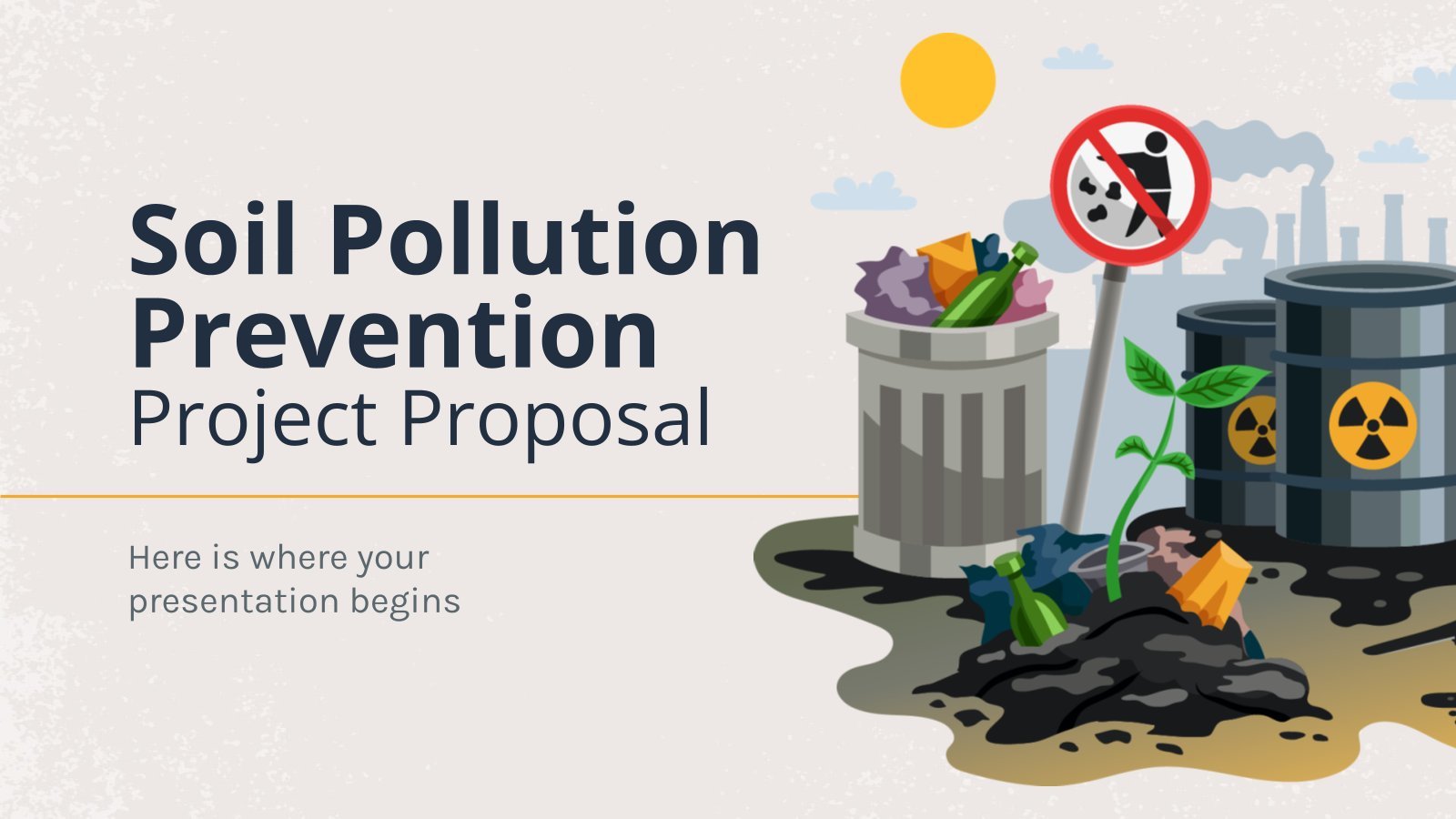
28 templates

public health
35 templates

holy spirit
38 templates
Biology Presentation templates
Give interesting presentations about biology with these free ppt templates and google slides themes. all life forms should enjoy a nice slide deck, related collections.
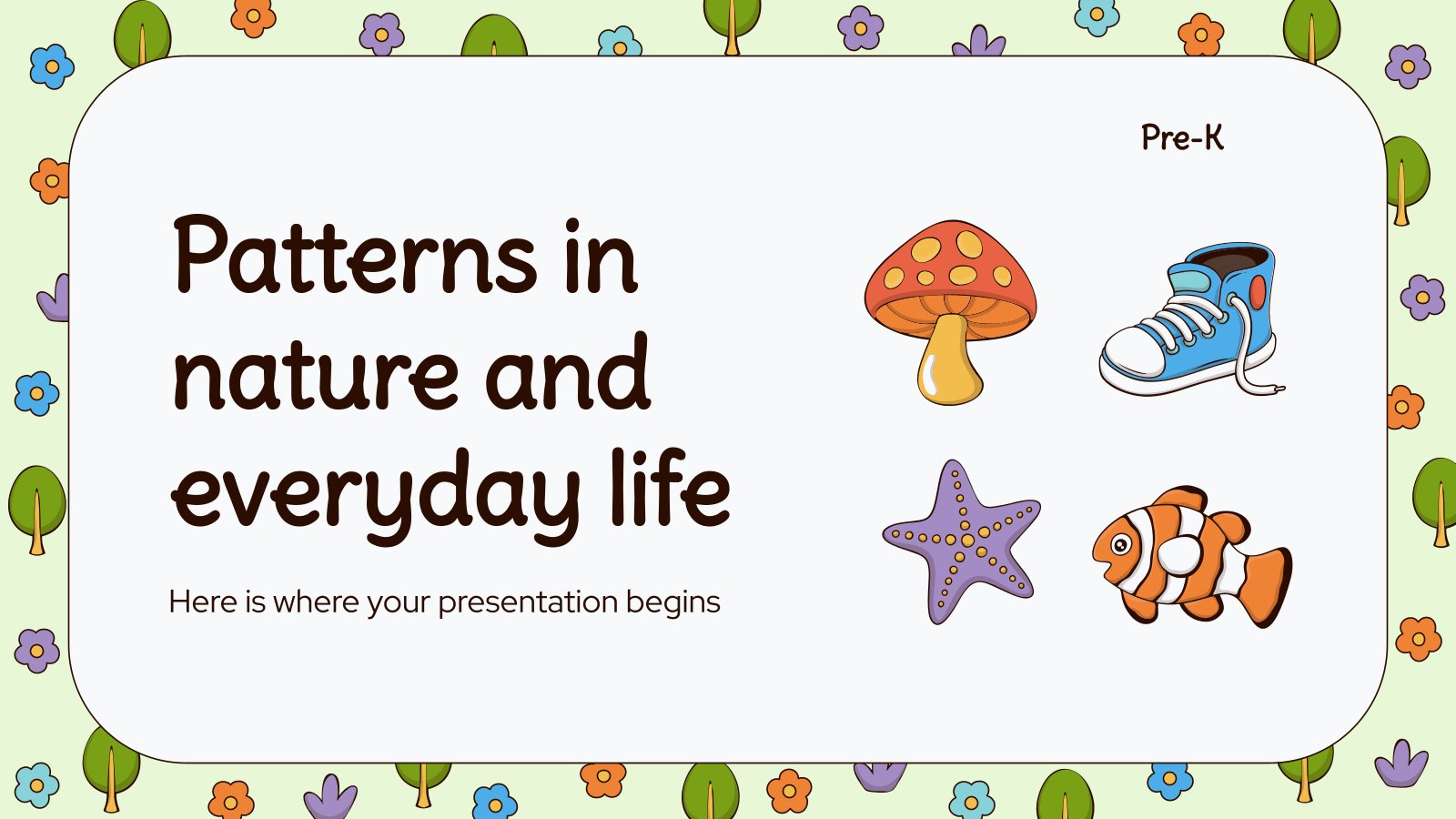
18 templates

27 templates

Middle School
25 templates

High School
68 templates

66 templates

Biology Infographics
Download the Biology Infographics template for PowerPoint or Google Slides and discover this set of editable infographics for education presentations. These resources, from graphs to tables, can be combined with other presentations or used independently. The most important thing is what you will achieve: transmit information in an orderly and...

Machine Learning in Biostatistics - Master of Science in Biostatistics
Download the Machine Learning in Biostatistics - Master of Science in Biostatistics presentation for PowerPoint or Google Slides. As university curricula increasingly incorporate digital tools and platforms, this template has been designed to integrate with presentation software, online learning management systems, or referencing software, enhancing the overall efficiency and effectiveness...

Biology Subject for High School: Birds Beaks & Adaptations
Download the Biology Subject for High School: Birds Beaks & Adaptations presentation for PowerPoint or Google Slides. High school students are approaching adulthood, and therefore, this template’s design reflects the mature nature of their education. Customize the well-defined sections, integrate multimedia and interactive elements and allow space for research or...

Science Subject for High School - 9th Grade: The Building Blocks of Life Infographics
Download the Science Subject for High School - 9th Grade: The Building Blocks of Life Infographics template for PowerPoint or Google Slides and discover this set of editable infographics for education presentations. These resources, from graphs to tables, can be combined with other presentations or used independently. The most important...

Animal Infographics
Download the Animal Infographics template for PowerPoint or Google Slides and discover the power of infographics. An infographic resource gives you the ability to showcase your content in a more visual way, which will make it easier for your audience to understand your topic. Slidesgo infographics like this set here...

Premium template
Unlock this template and gain unlimited access
Biology Thesis
Aristotle said that “by ‘life,’ we mean a thing that can nourish itself and grow and decay.” Biology is, indeed, the study of life as such. If you have just finished your thesis on biology and your viva is approaching, use our Biology Thesis template!

Ovarian Cancer Day
Download the Ovarian Cancer Day presentation for PowerPoint or Google Slides. Healthcare goes beyond curing patients and combating illnesses. Raising awareness about diseases, informing people about prevention methods, discussing some good practices, or even talking about a balanced diet—there are many topics related to medicine that you could be sharing...

Anatomy and Physiology Major for College: Cell Biology
One of the most intriguing subjects of a major in Anatomy and Physiology is Cell Biology, and this template provides an introduction to its fascinating universe. From the basics of cellular structure and function, to specialized topics such as organelles and DNA replication, this template will provide an overview that...

Science Subject for High School - 9th Grade: The Building Blocks of Life
When you stack lots of building blocks, you end up having a nice figure or building, but when you have lots of building blocks of life, you get organisms! Use this template for educational purposes and teach your students what are cells. We have added illustrations that are funny so...

Science Subject for Elementary: Reproductive System
This presentation template is perfect for teaching elementary school students about the reproductive system. It includes engaging and informative illustrations to help reinforce understanding of the topic. Students will learn about the anatomy of reproduction, such as components like sperm and ovum, and they will understand how these components work...

DNA Lesson for High School
Download the DNA Lesson for High School presentation for PowerPoint or Google Slides. High school students are approaching adulthood, and therefore, this template’s design reflects the mature nature of their education. Customize the well-defined sections, integrate multimedia and interactive elements and allow space for research or group projects—the possibilities of...

Science Subject for Middle School - 9th Grade: Biology
If you encourage your students to get interested in science since middle school, who knows, some of them could even become renowned scientists! Let's go step by step: first, download this template and customize it so that you have a slideshow for your biology class. Define concepts in its slides,...

Marine Biology Science Lesson for College
Here’s a beautiful marine biology template if there ever was one! True to form, it’s all dreamy watercolors in ocean shades and an abundance of marine animal and plant life. From freshmen to grad students, everyone will be happy to listen to a lesson on this template! Download it today...

Biochemistry Lesson for High School
How does the world around us work? That is a question too broad to be answered in a single class, but you can explain to your students in your next class a tiny and important part of its functioning and composition: what is a molecule and how they are made...
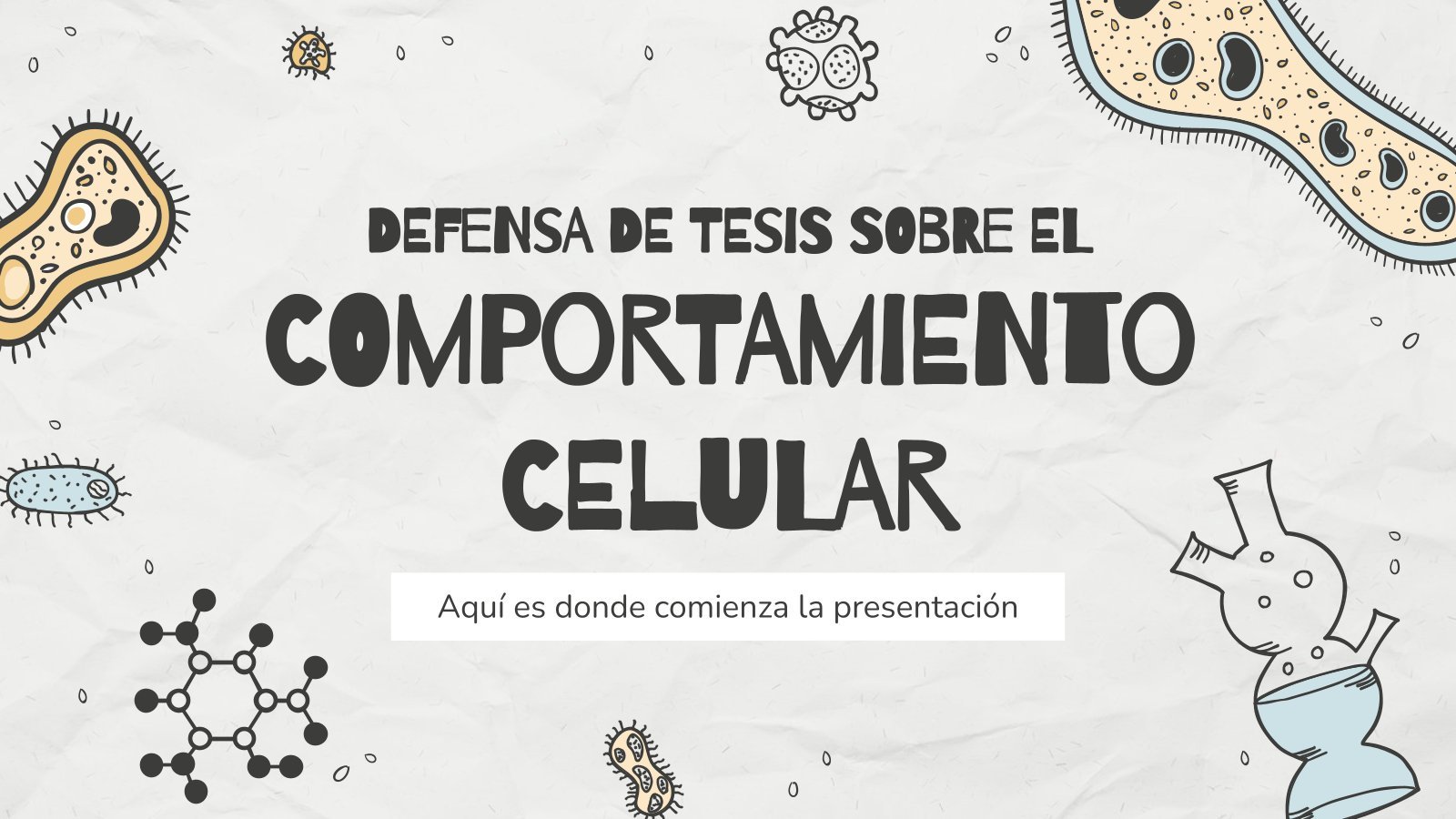
Cell Behavior Thesis Defense
You're going to need a good number of zeros in order to write how many cells there are in the human body. How do they work and what's their function? People like you, who've studied cells, can help us know a bit more about them! We've got something in return:...
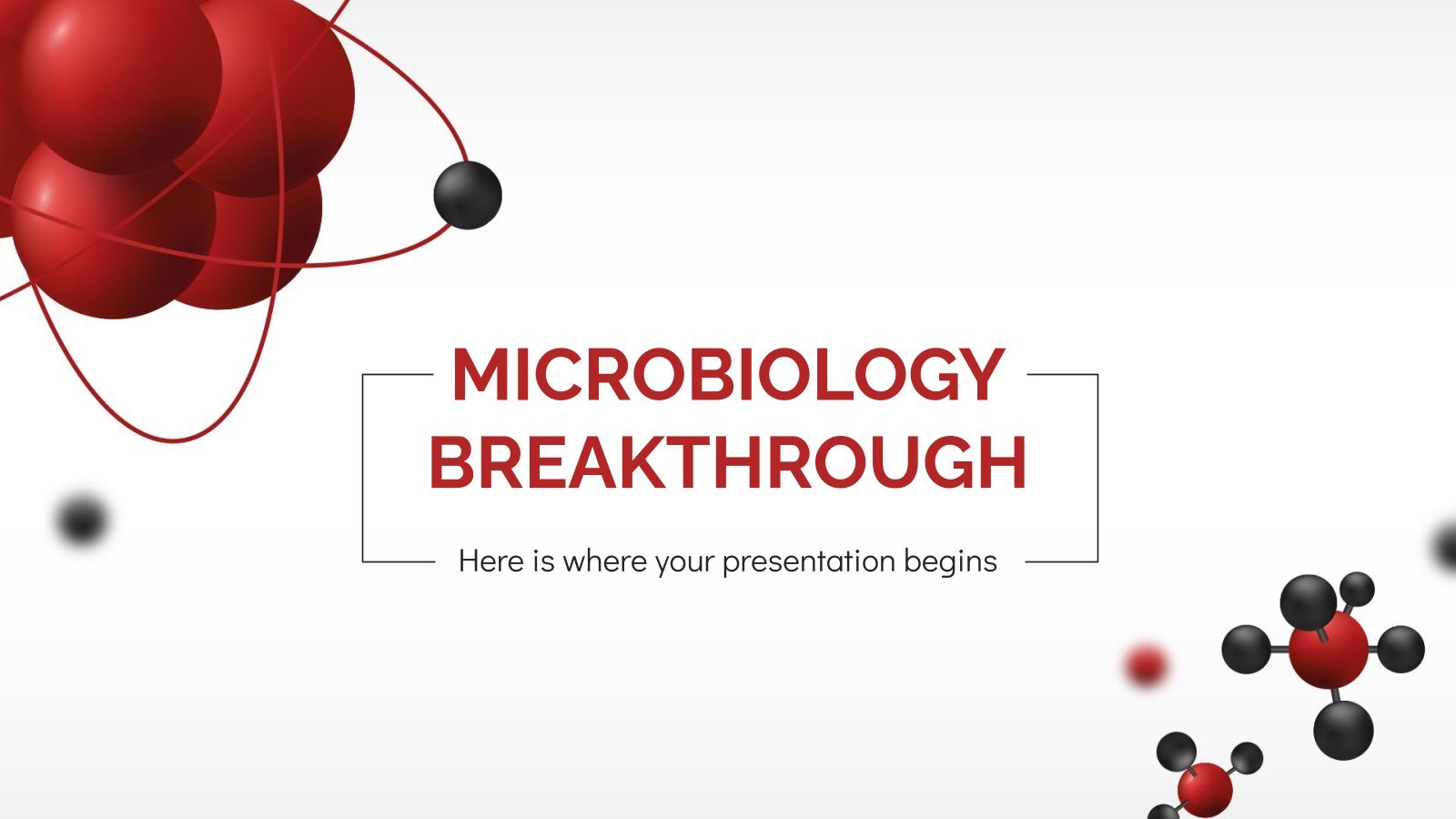
Microbiology Breakthrough
Advances in medicine are always important events, and it’s great if the new findings can be presented in a clear manner. If you want to make a contribution to the medical community and share what you found out in your research, this new breakthrough presentation template is for you.

Science Subject for High School - 9th Grade: Molecular Genetics
DNA is fascinating! The Slidesgo team marvels at how within something so microscopic, there can be so much information about not only whether we have green or blue eyes, but even about our personality. So, genetics defines us and, therefore, studying it is very important. In any high school science...

Cellular Morphology
Download the Cellular Morphology presentation for PowerPoint or Google Slides. The education sector constantly demands dynamic and effective ways to present information. This template is created with that very purpose in mind. Offering the best resources, it allows educators or students to efficiently manage their presentations and engage audiences. With...
- Page 1 of 20
New! Make quick presentations with AI
Slidesgo AI presentation maker puts the power of design and creativity in your hands, so you can effortlessly craft stunning slideshows in minutes.

Register for free and start editing online
- Biology Article
- 25 Important Topics In Biology
25 Important Topics in Biology
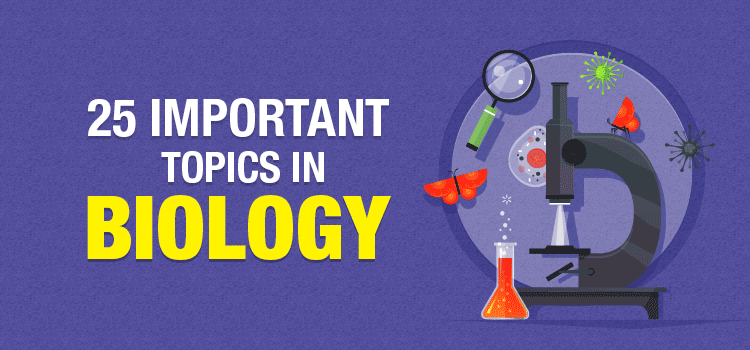
Following are a list of biology topics that have been carefully selected according to their scope and importance. These topics are elementary and form the basis of much more advanced concepts in higher classes. Moreover, questions frequently arise from these topics in various competitive exams. Hence, students will find this list most beneficial for their exam preparations.
1. Photosynthesis
Photosynthesis an important process that is observed in plants and certain microscopic organisms. Furthermore, all life on earth is directly or indirectly dependent on this process. It is even speculated that the evolution of life on earth was significantly influenced by photosynthesis.
Complete Article: Photosynthesis
2. Carbon Cycle
The carbon cycle is a biogeochemical process that also has a significant impact on life. The cycle essentially explains how carbon is incorporated and exchanged among the various entities (such as living organisms, atmosphere, lithosphere, hydrosphere etc).
Complete Article: Carbon Cycle
3. Nitrogen Cycle
Nitrogen is an important element required for life. However, neither plants nor animals can extract nitrogen directly from the atmosphere, instead, they rely on a series of biological and/or physical processes to incorporate into their systems. These set of processes contribute to the nitrogen cycle.
Complete Article: Nitrogen Cycle
4. Difference Between Mitosis And Meiosis
Mitosis and meiosis are two types of cell divisions that are observed in living organisms. One of the major differences between the two is that mitosis occurs during growth and maintenance while meiosis occurs only during sexual reproduction.
Complete Article: Difference Between Mitosis And Meiosis
5. Flora And Fauna
Flora refers to all plant life while fauna refers to all animal life. There are over 8.7 million species of living organisms identified to date and more being discovered every day. Life is so abundant that every nook and corner of the planet is teeming with life.
Complete Article: Flora And Fauna
6. Human Digestive System
Digestion is an important life process and is observed in a multitude of life forms. Some have a rather simple system while others are much more complicated. Unsurprisingly, humans have a digestive system too, and it is much more advanced with a host of organs and glands that perform very specific functions and roles.
Complete Article: Human Digestive System
7. Human Heart
The heart is an important organ usually found in most higher animals. Even invertebrates have a heart that pumps blood into their cavities. However, unlike the invertebrates, the human heart is quite advanced with respect to its structure, functions and capabilities.
Complete Article: Human Heart
8. Sense Organs
To interpret the world around us, we have various senses and sense organs. These sense organs provide information which helps to make decisions and perceive the environment and associated stimuli.
Complete Article: Sense Organs
The cell is the most basic, structural and functional unit of life. A cell can be classified based on various criteria (such as plant and animal cell, prokaryotic and eukaryotic cell, types of cells present in human tissues or plant tissues etc.
Complete Article: Cells
10. Human Brain
The brain is one of the most important organs which control nearly every aspect of our body. It is also one of the most complex organs in the entire body, with billions of neurons that relay information between the brain and the body.
Complete Article: Human Brain
Also called the fluid connective tissue, blood (and lymph) carries oxygen, essential minerals and nutrients to the cells. It also collects the metabolic waste products to be eliminated from the body. Humans are not the only organisms with blood, earthworms, spiders and even leeches have blood.
Complete Article: Blood and its Components
12. Soil Profile
The dirt beneath your feet is made up of several distinct layers, each with its own physical and chemical properties. Soil also varies from place to place due to their parent material (the original layer of rock where the formation of soil takes places.)
Complete Article: Soil Profile
13. Transpiration
Transpiration is the process where water vapour is let out through the stomata on the leaves. It is a very crucial process that performs two major roles – pumping minerals and water to the leaves for photosynthesis and removing excess heat from the plants.
Complete Article: Transpiration
14. Gymnosperms
Gymnosperms are a group of seed-producing plants that have been around far longer than the angiosperms. The plant’s Greek-origin name translates to “naked seeds” as they the seeds are not enclosed in any way (unlike the angiosperms).
Complete Article: Gymnosperms
15. Saprophytes
Saprophytes are organisms that consume dead or decaying organic matter. Certain species of plants, bacteria and fungi follow this form of nutrition. However, fungi, in particular, are well-known saprophytes as they are the principal decomposers in an ecosystem.
Complete Article: Saprophytes
16. Biofertilizers
Biofertilizer is a fertilizer that contains living or latent microbes. These forms of fertilizers help to promote plant growth by increasing the number of essential nutrients available to the plants. Traditionally used biofertilizers include Rhizobium, blue-green algae and Azospirillum.
Complete Article: Biofertilizers
17. Rhizobium
Rhizobium is an important soil bacteria that helps to convert the atmospheric nitrogen into fixed nitrogen, which is then usable by plants. It does this once it finds a base inside root nodules of plants such as legumes.
Complete Article: Rhizobium
18. Ecology
Ecology is the branch of biology that deals with the relationships that exist between organisms and their surroundings.
Complete Article: Ecology
19. Adaptation And Habitats
Life on earth resides in very diverse environments with many factors and variables (such as temperature, humidity, altitude etc). To ensure their best chances of survival, life develops various adaptations to cope up with the environment and with other life forms. One of the best examples of adaptations is camouflage, where predators and prey blend into their environment for predation or to avoid predation.
Complete Article: Adaptation And Habitats
20. Evolution
Throughout the earth’s 4.54 billion years of history, countless organisms have come and gone. The very first undisputed signs of life appeared roughly 3.5 billion years ago, though there is divisive evidence that it emerged as early as 4.2 billion years. But the question of “How life came to be” still remains unanswered.
Complete Article: Evolution
21. Plant Cell
Plant cells are vastly different from animal cells, though both are eukaryotic in nature. Moreover, plant cells do not have certain organelles like lysosomes or centrioles. However, they possess various other cell organelles that facilitate the process of photosynthesis such as chloroplasts.
Complete Article: Plant Cell
22. Animal Cell
Animal cells are quite similar to plant cells. However, one of the major differentiating factors is the absence of a cell wall. Other organelles like chloroplasts are absent as well.
Complete Article: Animal Cell
23. Difference between Prokaryotic and Eukaryotic Cells
One of the ways cells are classified is based on the presence or absence of a nucleus and nuclear membrane. Prokaryotic cells lack the aforementioned while eukaryotic cells do.
Complete Article: Difference between Prokaryotic and Eukaryotic Cells
24. Heredity
Also known as biological inheritance, it is the set of processes where traits from parents are passed on to their offsprings either through sexual or asexual reproduction.
Complete Article: Heredity
25. Biomolecules
A biomolecule is a term used to describe the molecules that are found in organisms and it takes part in important biological processes and cellular activities. Examples include proteins, carbohydrates, nucleic acids etc.
Complete Article: Biomolecules
Explore more fascinating concepts about biology or other related topics by registering at BYJU’S Biology .
Important Links:
Biology MCQs
Biology Important Questions – Class 11 & 12
- Share Share
Register with BYJU'S & Download Free PDFs
Register with byju's & watch live videos.

Biology Powerpoint Templates and Google Slides Themes
Discover a collection of visually stunning and professionally designed presentation templates tailored to showcase the wonders of biology.
Explore Free Biology Presentation Templates

Illustrated World Wildlife Day
Embrace the beauty of our planet with this vibrant, mix media PowerPoint and PPT template, perfect for everyone passionate about ... Read more

Tropical Amazon Rainforest Newsletter
Dive into the lush, vibrant world of our Green Floral Presentation Template, perfectly crafted for marketing professionals seeking to captivate ... Read more

Biology Subject: Photosynthesis 101 Lesson Summary
Unlock the secrets of photosynthesis with our vibrant green, 3D-styled PowerPoint and PPT template, perfect for educators. Designed specifically with ... Read more

Cell Theory Science Lesson for Middle School
Elevate your science curriculum with our captivating Cell Theory presentation template, designed specifically for middle school teachers. Engaging illustrations in ... Read more

Botanical National Arbor Day
Celebrate the beauty of nature with our National Arbor Day PowerPoint and Google Slides template. Designed for everyone, this cute ... Read more

All About Weather Lesson for Elementary
Immerse your students in the wonders of meteorology with this captivating Powerpoint and Google Slides template. Crafted with an animated ... Read more

Food Webs Lesson for Elementary
Dive into our vibrant, illustrated Food Web templates, designed specifically for the elementary education sector. Make your science lessons engaging ... Read more

Human Body Systems Lesson for Middle School
Embrace the power of knowledge with our Sketchy Anatomy Powerpoint and Google Slides Templates. Ideal for educators and students, these ... Read more
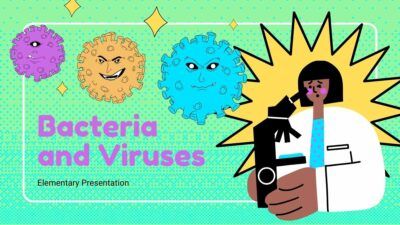
Bacteria and Viruses Lesson for Elementary
Unleash a world of microscopic marvels with our vibrant, illustrated Powerpoint and Google Slides templates. Ideal for elementary educators, these ... Read more

Symbiotic Relationships Lesson for High School
Engage your students with our animated, warm-colored Powerpoint and Google Slides templates, perfect for high school science lessons. These adorable ... Read more

Properties of Matter Lesson for Middle School
Dive into the fascinating world of science with our vibrant and interactive PowerPoint templates. Ideal for middle school educators, this ... Read more

Push and Pull Forces Lesson for High School
Unleash your teaching prowess with our visually stunning Powerpoint templates, perfect for High School science lessons. This vibrant, gradient design ... Read more

Human Impact on the Environment for College
Unleash the educator within you with this vibrant PowerPoint and Google Slides template! Perfect for teaching about the human impact ... Read more

Cute Science Subject for Middle School: Weather and Climate
Immerse your students in a captivating lesson using our animated, illustrated Weather & Climate PowerPoint and Google Slides templates. Designed ... Read more

Illustrated Causes of Global Warming Lesson
Immerse your students in an engaging environmental science lesson with our Beige and Blue Climate Change Powerpoint and Google Slides ... Read more
Professional designs for your presentations
SlidesCarnival templates have all the elements you need to effectively communicate your message and impress your audience.
Suitable for PowerPoint and Google Slides
Download your presentation as a PowerPoint template or use it online as a Google Slides theme. 100% free, no registration or download limits.
- Google Slides
- Editor’s Choice
- All Templates
- Frequently Asked Questions
- Google Slides Help
- PowerPoint help
- Who makes SlidesCarnival?

- SUGGESTED TOPICS
- The Magazine
- Newsletters
- Managing Yourself
- Managing Teams
- Work-life Balance
- The Big Idea
- Data & Visuals
- Reading Lists
- Case Selections
- HBR Learning
- Topic Feeds
- Account Settings
- Email Preferences
How to Make a “Good” Presentation “Great”
- Guy Kawasaki

Remember: Less is more.
A strong presentation is so much more than information pasted onto a series of slides with fancy backgrounds. Whether you’re pitching an idea, reporting market research, or sharing something else, a great presentation can give you a competitive advantage, and be a powerful tool when aiming to persuade, educate, or inspire others. Here are some unique elements that make a presentation stand out.
- Fonts: Sans Serif fonts such as Helvetica or Arial are preferred for their clean lines, which make them easy to digest at various sizes and distances. Limit the number of font styles to two: one for headings and another for body text, to avoid visual confusion or distractions.
- Colors: Colors can evoke emotions and highlight critical points, but their overuse can lead to a cluttered and confusing presentation. A limited palette of two to three main colors, complemented by a simple background, can help you draw attention to key elements without overwhelming the audience.
- Pictures: Pictures can communicate complex ideas quickly and memorably but choosing the right images is key. Images or pictures should be big (perhaps 20-25% of the page), bold, and have a clear purpose that complements the slide’s text.
- Layout: Don’t overcrowd your slides with too much information. When in doubt, adhere to the principle of simplicity, and aim for a clean and uncluttered layout with plenty of white space around text and images. Think phrases and bullets, not sentences.
As an intern or early career professional, chances are that you’ll be tasked with making or giving a presentation in the near future. Whether you’re pitching an idea, reporting market research, or sharing something else, a great presentation can give you a competitive advantage, and be a powerful tool when aiming to persuade, educate, or inspire others.
- Guy Kawasaki is the chief evangelist at Canva and was the former chief evangelist at Apple. Guy is the author of 16 books including Think Remarkable : 9 Paths to Transform Your Life and Make a Difference.
Partner Center

IMAGES
VIDEO
COMMENTS
Zoology is a branch of biology that investigates all animals, both living and extinct. Zoology significantly aids in understanding the natural world and minimizing harm to animal populations and their habitats. Zoology topics for presentation look the following way: The impact of global warming on baby lizards.
Biology presentation topics that are interesting must be engaging, attention-getting, and academically relevant. They must deal with fresh findings as well as contentious issues. A superb topic is the foundation of a scientific argument that contains a noteworthy scientific concept. It should also spark greater debate and lead to more research ...
Research Topics in Biology for Undergraduates. 41. Investigating the effects of pollutants on local plant species. Microbial diversity and ecosystem functioning in a specific habitat. Understanding the genetics of antibiotic resistance in bacteria. Impact of urbanization on bird populations and biodiversity. Investigating the role of pheromones ...
A List of Researchable Topics for Biology. A list of researchable topics for biology students starts with several interesting biological topics concerning sociological perspective and ethical issues. The most debatable subjects are abortion, human cloning, genetic researches and the new ethics that should be created to resolve these issues.
She is the winner of the 2015 Stony Brook Fiction Prize, and her short stories have been published in Mid-American Review, Cutbank, Sonora Review, New Orleans Review, and The Collagist, among other magazines. The 49 most interest biology research topics are explored. We also offer links to variety of resources for research topics in biology.
Molecular Biology Research Topics For Undergraduates. 31. Studying the structure and function of DNA and RNA molecules. 32. Analyzing the regulation of gene expression in eukaryotic cells. 33. Investigating the mechanisms of DNA replication and repair. 34. Studying the role of non-coding RNAs in gene regulation.
If you'd like to focus on molecular biology, here are 15 good biology research topics for you: Ethical considerations in molecular genetics. Discuss the structure and component of the gene. Examine the restrictions in DNA. What are the peculiarities in modern nucleic acid analysis.
10 Controversial Topics In Biology. There are plenty on debatable and debatable topics switch biology. Such themes raises get int terms of theirs ethical part and sociological perspective. Yourself can prepares an oral presentation or adenine research white on one of them. In this section, we've prepared for you 10 controversial topics on ...
Some biology topics are easier for non-biologists to get more excited about than others, though. Whether you're looking for a research topic for a college paper or an area to specialize in if you're majoring in biology, here are some of the most interesting things going on in the biology world right now. 1. CRISPR and Genetic Engineering
Biology students pursuing microbiology research topics study a diverse range of microorganisms, including viruses, archaea, microscopic algae, and bacteria. The application of microbiology in almost all aspects of life makes it easier for students to have an innate passion for writing about this topic.
Prepare compelling presentations that emphasize the finest fascinating biology issues to encourage students to devote identities to attract interest for the subject. Thereby, while creating a Biology presentation, you may emphasize intrinsic interest and encourage people to learn and gain more about the study of living organisms. Botany:
Genetics. Because it touches the lives of all living things in amazing ways, genetics is a high-interest biology topic. In your presentation on this topic, discuss the ways in which genetic material is passed from one generation to the next, exploring potential outcomes of genetic combinations and helping listeners gain a better understanding ...
Biology PowerPoint presentations are slide-based presentations created using Microsoft PowerPoint or similar software that focus on various topics within the field of biology. These presentations typically contain text, images, diagrams, and other multimedia elements to convey information and engage the audience.
iBiology Research Talks by Topic. At the heart of iBiology are over 600 talks from the world's leading scientists, sharing their research, their experiences, and the joys of discovery.
For people who want the original PowerPoint file, you can download the PowerPoint Slide Show (.ppsx). Open the file from within PowerPoint, and you will have a fully editable version of the presentation. Modify it, save it, use it however you wish. Unit 1 - Cell Types and Cell Structure. HTML 5. Powerpoint. Unit 1 - Lab Slides: Cell Types. HTML 5.
When presenting complex science presentation topics in the classroom, you should stick to one key point per slide, and only reveal one idea or concept at a time. By only sharing the most relevant information, you're serving your presentation in bite-size chunks, thus making it easier to focus on. Keep your slides clean, too.
Lookup for an interestingly biology topic for our presentation, essay, or research paper? This article contains everything you might need! The first unterabteilung lists the most related branches of nature. Which other sections close top 100 fascinating biology topics as well as one most controversy issues in the discipline.
Informative Speech Topics About Science. From biology to chemistry to genetics, science encompasses many subjects. Where modern technology meets cutting-edge discoveries, these topics are for inquisitive researchers who want to dig into the data. ... Watch our video for 10 presentation ideas: Informative Speech Topics About History. They say ...
Make sure to adjust the size or resolution to create good images for your presentation. Use a snipping tool (e.g., Windows has Snipping Tool) to cut only the essential images or parts of images to insert in your presentation. It's even better if the online paper gives you different sizes of an image to download. Choose more pixels than fewer.
Download the Biology Infographics template for PowerPoint or Google Slides and discover this set of editable infographics for education presentations. These resources, from graphs to tables, can be combined with other presentations or used independently. The most important thing is what you will achieve: transmit information in an orderly and ...
Moreover, questions frequently arise from these topics in various competitive exams. Hence, students will find this list most beneficial for their exam preparations. 1. Photosynthesis. Photosynthesis an important process that is observed in plants and certain microscopic organisms.
We've organized these presentation topics for students by subject so you can easily browse through and find what you're looking for. Each section also comes with a bonus presentation template! We've also included some tips on designing a presentation once you've chosen a topic. For example, a flowchart data widget can help with a historic ...
These biology presentation templates are suitable for educational purposes, making them ideal for teachers, professors, and students. They can be used in biology classes, science fairs, or any presentation related to the field of biology. Download these biology templates to create engaging presentations that bring the wonders of science to life.
When in doubt, adhere to the principle of simplicity, and aim for a clean and uncluttered layout with plenty of white space around text and images. Think phrases and bullets, not sentences. As an ...